#and further proving that you do not understand character growth or development in the least
Explore tagged Tumblr posts
Text
Wow. You had a lot to unpack, and I love it. I agree with everything you stated. I really don't understand why they didn't build on the lore they had established. Especially with the whole Sun King Iriv, who journeyed to the forbidden west and was never heard from again. That could have been an interesting quest.
The game promos hyped up Regalla and the rebel tenakth being the main antagonist focus in the game but they were barely in the game and served to be a misdirected filler with no real payout in the end. Regalia dies no matter if you choose to spare her, but at least she dies more honorably.
I liked Zo, I just didn't like how her character starts out already with Varl and no explanation of the timeline of how they met and decided to be together. I could accept that they first met when Varl went looking for Aloy in the prologue, or Aloy met her first and asked her to go be a distraction for Varl as she went to the proving lab. Also, she seems more fit to be with Erend than Varl. Then, ending her story in the game being pregnant, these type of arcs usually have them dying after birth. Others would have her being even less of a prominent character.
I agree with the choices that were made in HZD not being carried over in HFW. I hope that the developers recognize that in the next game. Another thing is those emotional choices I can't stand that they have only three instances of you have Aloy make emotional dialogue choice. In HFW, they do it a few more times, but it really doesn't affect anything.
Now on Elisabet and Aloy relationships. With Elisabet, we only have Tilda's account of events. We even hear Tilda say that she wanted more, but Elisabet didn't. And while that could have been her depression, her losing her mother, but it does tell us that their relationship wasn't healthy. Now for Aloy being able to open up and have intimate feelings for another person was great but it was a bad direction to go for a lot of reasons. One being that this was done in a dlc. Two it was with a new character that we are kinda forced to be with. Three it literally comes out of nowhere. After the second or third main quest of the dlc Aloy suddenly has feelings. The queer fandom of the franchise became very aggressive and argumentative because of this and it ruined anyone getting to enjoy an emotional growth in Aloy's character. The world of horizon doesn't have sexuality. I still hope that we'll get to have romantic options for Aloy in the next game, but if not at least make Seyka better, because I still would never make her a romantic choice.
The Zeniths were a choice. Entitled billionaires who fled a dying earth, built a colony, achieved immortality with biomedical supplements and cybernetics. Then just because they weren't satisfied the digitized themselves into an ai entity and let it fester. Come back to earth to steal a copy of Gaia, to recreate a new earth, which served no purpose because they weren't going to establish a civilization they where just going to do nothing except horde themselves in immortality and luxury. Then having that cliche of a zenith escaping as the main story of the dlc, was ridiculous. They should have used Vast silver, another separate AI. It was ridiculous that it was laughable.
I really don't know what to make of Beta. Another clone was expected, but her character being so isolated and kept merely as a tool. Now if her character was more like the Zeniths then there would be more to work with. One obvious theory is that Tilda had something that had Elisabet's DNA on it, other is that they had access to the lighthouse keeper protocol through Hank Shaw before he was discovered and kicked out.
Ted Faro, like you, I wish they kept him in hzd, but it did make sense to further his lore to see how it ended. That whole quest made me feel uneasy. From the voice recordings of Kanya, seeing that statue of him, seeing the Ceo dressed liked him, the chair in the medical bay. Hearing Ted's recordings. Seeing that mass for the first time and realized what it was. Going forward there won't be much said about him. So there is some comfort in that.
The tribes were good. Yet there was a political element in each tribe we came across. For the Oseram it was Ulvund trying to gain concessions while abusing any authority he had. Opening a mine that was shut down due to being dangerous and causing the duant to be overrun with bristlebacks thus causing the work stoppage.
With the Utaru, an elderly member ordered her apprentice to murder a joining member of the chorus, because she didn't like her ideas and didn't want things to change.
For the Tenakth there's both Hekarro and Regalla, but there's also Yarra and Drakka. Yarra only cares about being in charge that she kills anyone who challenges her authority. She becomes so paranoid that she's ready to blame everyone else and keep the low water supply a secret. Drakka, while also self serving, is more opened to finding new solutions that pleases everyone.
With the Quen it's more with the split colony that got separated and diverted to Los Angeles. They no longer live in rule under their empire and should have access to focuses.
I was upset about what they did with Talanah and her whole arc with finding Amadis. It's so infuriating that I am not going to talk further about it.
And that is my pov so far.
Well I finished Horizon Forbidden West (dlc included) today. The quality of life improvements were very good, I have absolutely abused the bottomless storage space. Not sure how I feel about the story though. I have... issues with it.
15 notes
·
View notes
Text
seeing the "bakugou literally hates deku and will always hate deku, also he can never be forgiven from what he did in season 1" argument in the year 2021 and in the context of literally everything that has happened within the series is the funniest thing ever
"bakugou will always hate deku" when bakugou canonically
sees deku as a worthy rival (on the same level as/possibly higher than todoroki) and since UA, has never particularly considered deku to be weak
has been watching deku since the very beginning. he also pays very close attention to deku's moves when they fight
is the first student outside of deku to know about one for all and promised not to tell anyone about the secret, when he easily could if he really hated deku that much
actively helps deku with his training and figuring out more about the OFA holders
is capable of holding a normal conversation with deku now and is considerably more understanding, even after their awful history
has only genuinely broken down emotionally in front of deku, and has only been moderately comfortable with deku (and all might) seeing him as weak. as far as I'm aware, no other student has seen him cry before
is willing to die for deku. he is willing to lose everything - his quirk, his privileged life, his future - for deku
cares about deku and wants to keep him safe/alive because "something about him makes [bakugou] want to keep him at arm's length" (284)
doesn't seem to mind at all when deku, someone he supposedly "hates", calls him kacchan, an endearing, innocent childhood nickname even though they are both 16 and training to be mf heroes
loves deku platonically thanks to all the recent chapters, even if his own dumbass brain hasn't caught up to that yet. argue with the wall lmao
"bakugou can never be forgiven from what he did in season 1" when bakugou canonically
addressed that the shit he did to deku was terrible. he's taking full accountability for his past actions, which is something lots of kids his age IN REAL LIFE can't do yet. if you're gonna judge a fictional character by irl morals and ethics, at least be aware that plenty of bratty irl 16 year olds don't take the full blame when they fuck up because they're under the mindset that they're young and can afford to make big mistakes.
is actively trying to atone, and has probably been trying to do that since as early as deku vs kacchan part 2, which is fully animated in s3 and has been out for years now
doesn't want to take the easy way out of his wrongdoings (aka just asking for forgiveness and moving on). he told all might that he wants to atone, not deku. he wants to prove to deku that he's changing without deku automatically forgiving him
"bakugou literally told deku to k*ll himself"
yeah, when he was 14. lol. I know that doesn't excuse something as extreme as a death threat but have you MET middle schoolers? I've had my fair share of shitty bully experiences throughout my adolescence and now that I'm older, I recognize that they were young themselves and have probably been going through their own troubles. still doesn't excuse it, but just take his fucking age and his background into account. he's also trying to atone for that shit so what else do u fucking need from this 16 year old trauma magnet lmfao
in CHAPTER/EPISODE 1 OF THE WHOLE SERIES??? dawg that was YEARS ago. we are completely past that, keep up!
it's heavily implied that this comment was super out of nowhere, and nothing like what bakugou usually says to deku. his friends said that was really out of line. bakugou was probably also aware of how harsh it was. it's further shown in the small heroes rising promo manga, "deku and bakugou rising" (I think that's the name), that bakugou typically ignored deku and let him do his own thing, with only a couple mild verbal jabs here and there (the insults aren't even special to bakugou - deku was quirkless, meaning that he was getting teased by literally everyone in the messed up quirk society)
deku didn't take this comment to heart and canonically cared more about BAKUGOU'S reputation after saying something so insensitive. he never once thought about actually "taking a swan dive". he may have low self esteem but he's not THAT swayed by outside opinion. in fact, he's really fucking stubborn and nobody has phased him from his hero dream except all might, his literal childhood idol, in the second chapter/episode. and even that lasted for like 5 minutes lol
people are allowed to grow and change into better people, janica. that's called character development. it's called growth in the real world.
like shit dude you don't have to romantically ship bakudeku - hell you don't even have to like them as a duo - but at least acknowledge that horikoshi is putting bakugou through a real character arc. I promise you, the current bakugou/deku dynamic is much more appealing than your season 1 echo chamber. we've moved on from the "bakugou and deku can never be on good terms" boat. we passed that ages ago LMAO
#aggressive antis be wildin#this isnt even me being pissed at antis actually#this is just me going dawg are we watching/reading the same series?#anyway stan bakugou's character development#not sure why we're still arguing this in 2021#bnha#mha#bakugou katsuki#midoriya izuku#bakudeku#bkdk#textpost#becki rambles about stuff
844 notes
·
View notes
Text
Reframing Cassandra
So maybe this is a nonsense idea, but I’ve been thinking about it the past couple of days re: Cassandra. Specifically... what could have happened if Cassandra had been assigned as Rapunzel’s personal guard, rather than her lady in waiting.
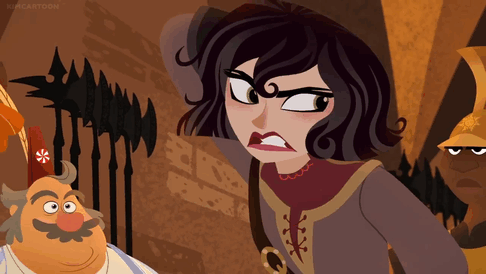
Some thoughts and wonderings below the cut. Warning for negativity in terms of how Cassandra’s canon arc unfolded over the course of the series. Disclaimer that these are just my personal thoughts, and should in no way make anyone feel bad for disagreeing. This read on the changes is also in-keeping with canon ships.
Without further ado...
I think it had the potential to change a great deal about what I, personally, didn’t really like about Cassandra’s canon arc and development.
Cassandra as an Individual
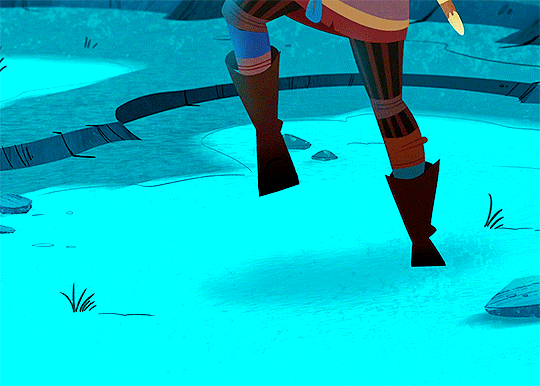
This is strictly a personal opinion... but I just don’t find the “she always felt like she was chosen second to Rapunzel” as a particularly meaningful or powerful narrative choice for her. I think it... functionally paints Rapunzel has a naive victim of Cassandra’s ambition, which I don’t think is fair to either female character.
I don’t mind the notion that Cassandra feels like she has something to prove. But I feel like pitting that sense against the Lost Princess of Corona is a disservice to both. I’d rather see it stand in contrast to the other guards.
I think it would be a stronger framework for that subplot of her character arc to be that she feels like a second-rate guard because she’s been assigned to protect one person rather than be an actual guard/given a leadership role. (Of course, this is no actually small task, and I think Cass would come to understand that with time).
I think also that it would feed into her overarching plot and role and relationship to other characters, which I’ll more about in a sec.
Cassandra and Eugene Tension
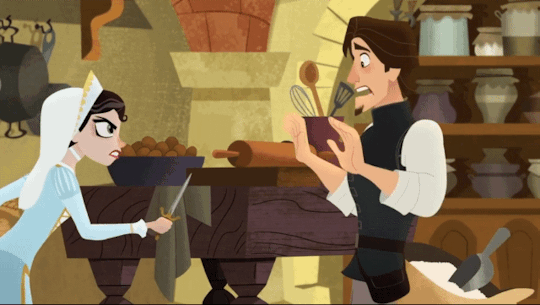
For the most part, I didn’t have a problem with that Cass and Eugene argued/bickered a lot. (I do wish there was more moments that counterbalanced it, but I digress)
But I didn’t quite understand where the animosity was coming from, and I kind of wish it had been explored more.
And I think that if Cass had been Rapunzel’s personal guard assigned by the king, then Cass’s distrust of Eugene (and Eugene’s corresponding frustration with her distrust of him) would make sense and also provide room for interesting growth between them.
Because now Cassandra’s literal job is protect the princess, and what evidence is there that Eugene isn’t just playing some kind of long game?
Meanwhile Eugene feels like time and time again he tries to prove how much he has changed, and everyone seems willing to believe him but Cass? And can he really blame her? Or fault her?
I just think it would also have that much more impact to hear Cassandra tell Rapunzel in season 2 that there’s no way Eugene would betray her like that (when Cass harbored that distrust of him for so long), or that moment in Season 1 when Cass gets knocked down and Eugene goes charging in to the fray to help her).
Cassandra and Rapunzel Tension, Fall Out, and Reconciliation
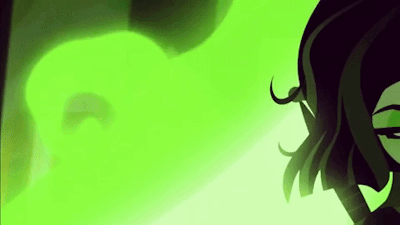
So Cassandra has plenty of moments already in canon where she tries to protect Rapunzel because she’s her friend. But I think coloring those moment by a sense of obligation rather than just friendship could help develop the growing resentment towards Rapunzel that Cass starts to feel, especially pressing into Season 3.
You also get the added dynamic of them both often being at fault for miscommunications and the disintegration of the relationship because Rapunzel almost certainly has issues with accepting “protection” because a lot of her childhood trauma is wrapped up in a neat little bow with the label “its to keep you safe”. So she doesn’t always want Cassandra to protect her, and she can take care of herself.
Meanwhile, Cassandra didn’t ask to be Rapunzel’s guard, and she doesn’t listen very well, so when Rapunzel does stupid stuff and is reckless, that puts Cassandra at a certain level of risk as well. (She also might see Rapunzel’s recklessness as a slap in the face in the sense of reading it as “I don’t need you”, even though Rapunzel is the one person that she’s supposed to protect?)
And I think directing that anger and resentment towards Rapunzel makes more sense--at least to me--if it’s not about other people and their reaction to the two of them. Because one thing that always bugged me about her canon arc is that while some of her anger towards Rapunzel is justified... I think a lot of it just... isn’t.
I just think there could be an interesting story to tell where Cass feels like she’s always trying to protect others (specifically Rapunzel) and nobody is trying to protect her. So Cassandra eventually starts seeking power as a means of self-protection.
I think Zhan Tiri can still play the roll she does in Cassandra’s betrayal in the sense of telling Cass what she most wants to hear as a means of manipulation. But I think fear is a powerful tool in that respect, and turning Cass’s main motive as a villain to be one of fear (like Varian’s is grief to an extent) makes her a more sympathetic villain than her canon arc.
I think also that such a turn makes it easier/more believable, in my opinion, for Rapunzel to hold on to that hope that Cassandra is still a good person. Because Rapunzel would understand what it’s like to be afraid and to feel like you need protection, and if she can recognize that Cass is scared--and that’s what’s motivating her through her villain arc--then I could understand why Rapunzel refuses to turn her back on her.
I also think that makes for a stronger reconciliation moment for them, and even if Rapunzel still uses her power to bring Cass back, I think the idea of “Rapunzel now chooses to actively protect the life of someone who did that so often for her and felt it was never reciprocated in full” a more powerful end to their friendship arc.
#tangled the series#tts#tangled#cassandra#just some thoughts that have been rattling around my head for a few days now.
121 notes
·
View notes
Text
First off, I am not sending hate to any Mileven shipper. Everyone is entitled to their own opinion. I will only be providing actual facts and evidence, and hopefully will be staying relatively unbiased. As always, this is a PRO-BYLER account. If you do not ship Byler you do not have to read all the way through :).
This will be a 2 part series. The first part will address MILEVEN and how they will not be endgame. The second part will address the likely hood of BYLER being endgame.
So, I’ve been sucked into the Mileven side of Instagram after liking ONE Mileven edit, which is besides the point. Recently I’ve noticed a lot of people say that “They were love at first sight!” Or that “Why would they break up now if they’ve had 3 seasons of development?!” So I’m going to go ahead and supply you all with:
MILEVEN VS BYLER.
PART ONE (MILEVEN)
To start off with the first statement, “They were love at first sight!”
May I remind you how utterly mortified Mike was when he found Eleven. As any 12 year old boy would be. He did not give her any form of “heart eyes”. He looked genuinely scared. He took her home as a courtesy, not because he was “madly in love with her!”. Obviously not everyone would take home a random 12 year old bald girl, but El being taken to the Wheelers was not meant to be seen as a romantic gesture, it was literally just a plot device for the Kids to figure out she had powers.
May I also remind you that Mike wanted to get rid of her. He stated multiple times that she was just a weapon, and a device to find Will. He only let her stay BECAUSE she knew who Will was. He was fully ready to let her go, and send her back to wherever she came from. In the end of it all, he only cared about Will and finding Will. El was simply used as a device to find him. Obviously, now, I do think Mike cares about El. But not in a romantic way, more so a “cute puppy way”. I think he loves her, but that he’s not IN LOVE with her, romantically.
The show has shown constantly how horribly they work together. El’s most confident and prideful moments were when she was AWAY from Mike. Mike’s most loyal and selfless moments was when he was AWAY from El. They do not compliment eachother like that.
Second of all, they have nothing in common. In season one when Mike was explaining his figurines to El, she looked genuinely disinterested. Now some may say that this could be because she didn’t quite understand what she liked back then, which just further proves that she shouldn’t be in a relationship! If she can’t decide if she likes a dinosaur toy or not, how is she supposed to decide if she likes Mike! And we also know that she did have the ability to differentiate between things she liked as she seemed genuinely interested in Nancy’s clothes and photos. The only thing they have in common is shared trauma! Notice how all the other couples share something:
JANCY: love for writing and adventuring
LUMAX: both are comical and enjoy the cinema and the outdoors
DUZIE: science
Along with most of the other couples. But what does Mileven have In common? Can anyone please name ONE good memory between the two when they weren’t in danger. All the “good memories” they have are from when the world was ending.
If you said “Oh, but they make out a lot!” That’s not a ‘good memory’, hell, that’s hardly memorable at at all. Hoppper, Will, and Lucas even admit that for those 6 months in between season 2 and season 3, all they did was make out. That is not love, that is infatuation. Infatuation is a strong desire for someone, mainly romantic, that focuses on the physical aspects of their relationship rather than the emotional. Love is a deep rooted feeling. You do not need to make out all the time to be in love. Love is emotional, of course it can be physical, but you need that strong feeling before any physical aspect of love can be genuine.
Mileven have nothing in common. It’s very clear that Mike is still into D&D and is a nerd. Especially as he might be in the Hellfire Club next season (a D&D club) and also because we’ve seen that D&D is going to be a big aspect of season 4, meaning he’ll most likely be infatuated with it again. It’s obvious that El needs to figure herself out first. She needs to develop into her own human being. She’s still learning. She’s into poppy colors and magazines and makeup (which is great!), but even on a more basic level, they still share nothing in common. Mike is a nerd, we have established that. And notice how in s3 (when he was with El) he felt the least like himself. He acted so out of character. He didn’t use weird Star Wars analogies or gush about the new movie coming out like previous seasons. Now of course one could say that he’s growing up, but we see that he is genuinely still a nerd as when he’s in time of crisis he goes back to those analogies. He goes back to gushing about the new toys he’s getting at Christmas, he goes back to being a nerd. It’s almost as if he’s wearing this mask, and at the end of s3 he forgets to put it on. And then El kisses him, and he realizes that he didn’t enjoy that. So we know for a fact that he is very much still into D&D and those other shenanigans atleast to an extent, considering how happy he was to hear that Will wasnt giving up the party or D&D. Shouldn’t Mike be with someone who is atleast a little similar to him? Regardless of his sexuality, shouldn’t he be with someone that allows him to be his true self? He was incredibly Cocky and arrogant in season 3, almost like he had to be a “man” for El, and in his mind, being a ‘man’ was giving up all of the things he loved, and only kissing El, almost as if she was an object he had to obtain more than an actual human. Which Max agrees with! He treats her more so of a mask he has to wear to cover his true self. Shouldn’t el be with someone who likes the same thing she does? But then again, what does el like?! Exactly! She needs to figure out who she is before she dates anyone. She didn’t even know what shirt she would like to wear!
Now I just find this silly. Development? Really? Okay let me show you their “development”
SEASON ONE: El could only speak 4 or 5 words. They had essentially zero romantic interactions besides the kiss at the end. If El and Mike never kissed (excluding the time they almost kissed in the bathroom), people would most likely only see them as a friendship. Let’s flip the tables a bit. If El was a boy and Mike and El never kissed, this would further prove that they don’t have any romantic tension. Lucas says it the best: “You only like her because she’s the only girl who isn’t grossed out by you!” Which I agree with completely. It’s more of an infatuation. Mike is infatuated with the idea of finally having a girlfriend. Because he knows something is wrong inside him and wants to ‘fix it’ by dating a girl, as if suddenly his sexuality identity issues would disappear. El doesn’t know anything about Mike, and to El, Mike is a hero. To El, Mike is fearless warrior. And Mike knows that isn’t true. But with el, it gave him the chance to start fresh. It gave him the chance to start and become a different person. He puts on his persona of being “strong” and being able to stand up for himself, yet in the end, it’s El who does the saving. The reason he ‘likes’ El so much is because she isn’t disgusted by him. But mike is afraid that if he shows his true self, El wouldn’t like him anymore, and he’d lose that mask. And without a girl to cling to, he’d finally have to confront his sexuality. Which is why we never see Mike being his true self around El. In every single season, he is this false person. He’s wearing a facade, to keep up with these lies. Because he fears that If El knew how nerdy he really was, she’d be uninterested, and he ‘can’t lose her’ because he knows that El is most likely the only girl who will never be grossed out by him. Because all the other girls in this town know who he is. That nerdy guy from the AV club. And he needs a girlfriend. He feels safe that way. Because if he doesn’t have a distraction from his sexuality then he might take an extra step on accident and accidently act on those feelings
Ep 1: making out
Ep2: breaking up
Ep 3-6: fighting
Ep 7: neutral
Ep 8 ½ : neutral
Very end of ep 8: together?
How is that romantic? So from what we know, Mileven got a kiss in season 1, a kiss in season 2, 2 make out sessions, and then they fought. HOW IS THAT A GOOD RELATIONSHIP?
90% of their relationship throughout all 3 seasons has been kissing and fighting. That’s literally it. Not once have we seen them just hanging out and talking. Not once have we seen them go on dates. And as Hopper, Lucas, and Will put: that’s all they do! The Duffer’s purposefully put that line in to show that, it’s really all they did for those 6 months. There was no emotion to that. Just kissing. That’s it. Kissing and fighting is all Mileven has been. And honestly they would have been pretty cute in season 3 if the Duffer’s hadn’t messed it up. But the duffers aren’t stupid! They did this on purpose! Because they wanted us to disagree with Mileven. They wanted us to find it obnoxious. Because they know that they don’t have chemistry! Finn and Millie are brilliant actors and could have definitely pulled that off, meaning the Duffers had to have specifically said to “not act in love”. Mileven is a summer fling, Finn said so himself. They are their true selves when they are apart, and when they are together romantically, they stunt each other’s growth. They’re way better as bestfriends. El needs to figure herself out before she can date anyone.
Thank you for reading part one! Part two will be up soon, and will follow why I believe Byler will be end game!
Heavy inspiration from @kaypeace21 & @hawkinsschoolcounselor
#stranger things 4#stranger things#byler#byler rights#byler theory#stranger things theory#anti mileven#byler is endgame#st4
92 notes
·
View notes
Text
Doctor Dorpden’s Critical Tips of Prestige
Note: This post was made with satirical intentions in mind. I’m only emphasizing because I’ve had a couple of comments on previous joke posts I’ve did take it seriously. With that said, here we go.
Tip 1: For starters, remember that when looking at the work, if the Mystic Knee twitches fast enough to punch a hole in a wall, this suggests that the work should be near the lowest of the low. No further development of opinion is needed.
Tip 2: For an equal degree of sophistication, give the warm comfort of nostalgia at least 5 times more chances than the new thing that MAY seem actually poggers.
Tip 3: If you have the anecdote of encountering shitty fans, then use them as a scapegoat for the show they flaunt over being shitty. Clearly, they’re always making the show the way it is.
Tip 4: If you haven’t heard much about a newer film or show you’re yet to watch, there’s an 85% chance that film or show is actually not worth your time. The Father (2020) isn’t as widespread as Joker (2019) for a reason.
Tip 5: At this point, just go for the Asian Artist Dick. I’m actually in the mood to see merit in that because I want to look edgy against cute doodles. Stop attacking Uzaki-Chan, you cowards!
Tip 6: Avoid the electronic tunes. They’ll make you smell like a bum, for there’s no structural in a music album that’s nothing but wubs.
Tip 7: If you see a Tweet that looks dumb, use it as a means of generalizing all the fans of a work as sharing that same opinion.
Tip 8: If the cartoon I’m given doesn’t provide me with mature ideas such as slicing an Arbok in half or fake boobs, then the cartoon might as well be on the same level as Teletubbies.
Tip 9: You know the music is (c)rap when it brings up drugs, regardless of lyrical context.
Tip 10: Raw mood is the indicator of quality cartooning. If you’re quick to assume the worst in the newest HBO Max original cartoon, then you got thyself a stinker. Same thing if you were super bummed out when watching a new thing, regardless of anecdotal context.
Tip 11: When you’re not given continuous throwbacks, ensure you’re as reductive and over-generalizing about the works shown as possible.
Tip 12: If your hazy and imperfect as hell recollection of a children’s film, whether it’s Wall-E or Lilo & Stitch, would describe said film as “too sugary” or “key-waving schlock”, then that HAS to be the case. No meat on that bone whatsoever.
Tip 13: Simpler, more graphic style that isn’t as realistic as old-school Disney or Anime? You got yourself a lazy style with zero passion put into it.
UPA? Who’s THAT?!
Tip 14: Don’t trust anyone saying that western children’s cartoons had any form of artistic development after 2008 (with, like, TWO exceptions). If it did, why didn’t we go from stealing organs in a 2001 cartoon to showing opened stomachs in a 2021 cartoon?
Tip 15: Big booba is always important to the strong female character’s quality.
Tip 16: Only MY ships count, for they provide me with a feeling of intelligence.
Tip 17: “PG-13″ and “R” rating just simply mean you’re not caring for expressing themes in a sophisticated manner. It’s just THAT simple until I dictate otherwise.
Tip 18: In this age of smelly radicals, “Death of the Author” is more important than ever. Without it, this’ll imply that a classic like The Matrix was secretly toxic, due to what the Wachowskis have to say about it being an “allegory of trans people.”
Tip 19: Turn the fandoms you hate into your torture porn. Ask in Tweets to Retweet one sentence that’d “trigger” them. Go out of your way to paint all of them as blind consoomers. That’ll show them, and it’ll show how much more intelligent you are compared to those clowns.
Tip 20: Whatever the Mystic Knee dictates upon the first viewing of a work is what shall indicate the full structural extent of the film.
Tip 21: The mindset of a 2000s edgelord is one that actually understands the artistry of the medium of animation. Listen to that crazy but ingenious man.
Tip 22: Because sheer ambition makes me feel manly, the high pedestal you bestow upon a cartoon work should be based mostly on the mere mention or mere suggestion of serious topics. This means that pure comedy is smelly.
Tip 23: Is the new work tackling subjects that you’ve loved a childhood work of yours for covering? Just assume it’s super bare-bones in that case compared to the older case, for there’s nothing the older work can do to truly prove itself otherwise. Seriously, Letterboxd. Stop giving any 2010s cartoon anything above a 4/5
Tip 24: If the Mystic Knee is suggesting that the work is crummy, then consider any explanation off the top of your head for why the work in question is crummy.
Tip 25: Sexual and gender identity is inherently political, so don’t focus on them in the story. It’s no wonder why Full Metal Alchemist has caught on more than the She-Ra reboot.
Tip 26: Since I got bothered by a random butt monkey type character in a crummy cartoon, I’m now obligated to assume that having a butt monkey will only harm the writing integrity of the cartoon.
Seriously, Mr. Enter....what?!
Tip 27: We’re at a point where pure comedy for a kids’ cartoon is doing nothing but dumbing down the children. Like seriously...... I doubt Billy and Mandy would ever use farts as a punchline, unlike these newer kids comedies.
Tip 28: The difference between the innuendo in kids’ cartoons I grew up on and the ones Zootopia made is the sense of prestige they give me. Just take notes from the former instead.
Tip 29: Wanna make a work of artistic merit? Just take notes from the stuff I whore out to. It’s just THAT simple until I dictate otherwise.
Tip 30: Always remember this golden rule: If the newer work, or a work you’ve recently experienced the first time, was truly great, why isn’t it providing the exact emotions from your younger, more impressionable years?
Tip 31: If the Mystic Knee aims to break the bones of a character doing certain things (.i.e. having body count of thousands; lashing out to character; etc.), that means the character is bad and deserves no redemption.
Tip 32: If you want me to believe there’s any intrigue or depth in your antagonist, give them redemption, for I am in need of that sorta thing being spelled out. Looking at you, Syndrome. Should’ve taken notes from Tai Lung.
Tip 33: In a case where you’re going “X > Y” (.i.e. manga compared to western comics), ALWAYS CHERRY PICK! Use the recent controversies of the “Y” item while pretending that the “X” item has never had anything of the sort.
Tip 34: BEFORE you bring up those comments that shat on the original Teen Titans cartoon back when it was new, whether for making Starfire “more PC” or whatever.......the DIFFERENCE between them and me is that THEY were just bad faith fools that couldn’t see true majesty out of blind rage. I, however, am truly certain that calling any western TV cartoon from 2014-onward a work that transcends its generation suggests a destruction of the medium.
Tip 35: Based on fandom growth, it shows that any newer show isn’t being watched much by kids, but rather loser adults that act like children. Therefore, there’s more prestige in what I grew with.
Tip 36: The focus on children is bad at this point since the children of today have attention spans that flies would have.
Tip 37: A select few screenshots (or even one) of either a less elaborate attacking animation, less realistic game graphics, or a less on-model image in a cartoon indicates EVERYTHING about the work’s quality.
Tip 38: Consuming or writing media where characters go through constant suffering is little more than gaining pleasure out of it. YOU SICKOS!
Looking at you, Lily Orchard!
Tip 39: Whether it’s a sexual awakening story or just simply a romance, focus on a character being lesbian, trans, bi, etc., then it shouldn’t be in a kids’ work. It’s too spicy for them by default. Kids don’t want romance anyway.
Tip 40: The very idea of a western cartoon with no full-blown antagonist (i.e. Inside Out) is a destruction of animated artistry. Sorry, but it’s just THAT simple until I dictate otherwise.
Tip 41: Unless it’s my fluffy pillow, such as Disney’s Robin Hood, it should be obligated to assume the inserting of anthros is only there to pleasure the furries. Looking at YOU, Zootopia!
Tip 42: With how rough and rash The Beast was, it shows that he was more of an abusive lover. Therefore, I refuse to believe that Beauty and the Beast has any of the meticulous moral writing that most of Disney’s other 90s films has.
Tip 43: When you suggest one work should’ve “taken notes” from another work in order to do better, BE VAGUE! Those who agree will be shown to be geniuses.
Tip 44: Remember how morally grey Invader Zim was? That really goes to show how little the Western Animation scene has been trying since that show. Really should just be taking notes from that series (and of course anime).
Tip 45: Even if I have a radar that clearly indicates such, hiding the item I look for inside an enemy is always bad, for I refuse to believe it would be inside the enemy.
Goddamn it, Arin!
Tip 46: People struggle understanding your gender identity or pronouns? All there is to see in that is a giant cloud of egotism that reads “My problems” zapping another smaller cloud that reads “other people’s problems”. Seriously, kids are starving, so WHAT if you identity confused someone. Grow a spine!
Tip 47: Stop pretending that adaptations should colorize how a story or comic series should be defined. No way in FUCK can a cartoon or film incarnation become the definitive portrayal of my precious superhero idol.
Tip 48: Enough with your precious “limited animation” techniques, YOU WESTERN HACKS! All you’re doing is admitting to sheer laziness and lacking artistic integrity. Now if you excuse me, I’ll be watching more anime, since that gives me a sense of prestige.
Tip 49: If getting five times more detail than the 2D animated visuals have requires someone getting hurt, so be it. No pain, no gain after all.
Tip 50: Yes, I genuinely struggle to believe there’s this majestic level of layered material without having the most immediate yet still vague re-assurance practically yelling in my face. But that’s STILL the work’s fault, not mine.
Tip 51: Every Klasky-Csupo cartoon has more artistic integrity than any of them cartoons with gay lovers such as Kipo or the Netflix She-Ra show.
Tip 52: If Sergio Pablos’ Klaus is anything to go by, we have no excuse to utilize those smelly as fuck digital animation “styles” found on Stinky Universe, Suck-Ra or Rise of the Teenage Mutant Ninja Turds.
Tip 53: Stop projecting your orientation onto works of actual talent. Seriously, how does Elton John’s I’m Still Standing expel ANY rainbow flag energy?
Tip 54: Hip hop and electronica have been the destruction of music, especially the kind that’s actually organic and not farting on the buttons of a beeping or drumming gadget.
Tip 55: The audience for cartoons has become significantly less clear over the years. We should just go back to Saturday mornings of being sold toys or shit kids actually want.
Tip 56: PSAs for kids shouldn’t be about ‘woke’ content. They should be actual problems such as doing drugs; not playing with knifes / outlets / matches; or acceptance.
Tip 57: The instant you realize a detail in a childhood work that’s better understood as an adult, you’re forced to paint that work as the most transcendent thing in the world. It’s just THAT simple until I dictate otherwise.
Tip 58: Before you lash out on ALL rich people, remember this: #Not All Rich People.
Tip 59: There’s nothing to gain out of the (c)rap scene other than becoming a spiteful, gun-wielding thug that sniffs weed for breakfast.
Tip 60: Since the Mystic Knee told me to get anal about prom episodes in several gay cartoons, this shows that writing about one’s younger experiences just makes you look pathetic.
Tip 61: Another smelly thing about Zootopia is how it was painting a police chief as stern and exclusive. #Not All Chiefs
Tip 62: Me catching a glimpse of Grave of the Fireflies as a kid and turning out fine shows that you may as well show kids more adult works without worry. No amount of psychological questions being asked will suggest otherwise.
Tip 63: There’s a reason why the Mystic Knee keeps leaning more toward the 90s and early 2000s than most decades. That knee KNOWS where there’s a sense of true refinement.
Tip 64: The BIG difference between rock and electronica? Steward Copeland actually DRUMS. All that the likes of Burial, Boards of Canada, Depeche Mode and several others did was push drum buttons.
Tip 65: One exception to the golden nostalgia is when the work in question doesn’t stuff your face with fantastical, bombastic stories. At which point, there can only be rose-colored blinds covering Nickelodeon’s Doug. Nothing of merit or personal resonance to be found.
Tip 66: Remember that the sense of nuance in the work comes down to there being everything including the kitchen sink, whether it involves multiple geographic landscapes; giving us hundreds of characters; etc. Only through the extremes will I be able to tell there is nuance.
Tip 67: Once you see a joke that has an involvement with sexual or violent content, just ignore the full picture and just reduce it to having nothing to it but “sex, violence, gimme claps.”
PKRussel has entered the chat
Tip 68: With all the SJWs messing up the art of comedy, lament the times where you could be called a comic genius, NOT a monster, for shouting out the word “STAB,” calling a gay weird, painting Middle Easterns as inherently violent, etc.
Tip 69: Guitar twang will always win out over (c)rap beats. There’s a reason your grandma is more likely to listen to Lynyrd Skynyrd than Kendrick Lamar.
Tip 70: Once the Mystic Knee notices a lack of squealing at the video game with linearity, that shows there’s more artistry in going full-blown open world.
Tip 71: Related to Tips 66 and 68, ensure your comedy gets as much information and mileage out of each individual skit as possible. EMPHASIZE if you need to. Continuously spout out your quirky phrase of “STAB” if needed.
Tip 72: Based on the onslaught of TV shows with many seasons and episodes, animated or otherwise, it shows that there’s more worth going for that than simply having a miniseries or a 26-episode anime.
Tip 73: Building off of the previous tip, you’re better off squeezing and exhausting every little detail and notable characterization rather than keeping anything simple and possibly leaving a stone unturned, especially if there’s supposed to be a story.
Tip 74: Playing through the fan translation of Mother 3 made me realize how much some newer kids’ works just try too hard to get serious. Why even make the kids potentially think about the death of a family member?
Tip 75: The fear I had over Sid’s toys from the first Toy Story and similar anecdotal emotions are the be-all indicators of what kind of show or film is fitting for the children.
Tip 76: Seeing this British rapper chick have a song titled “Point and Kill” just further exemplifies the fears I’ve had about rappers being some of the most harmful folks ever.
Tip 77: The problem with attempting to make a more “relatable” She-Ra is that kids aren’t looking for relatability. They want the escapism of buff fighters or something similar. This is why slice-of-life is so smelly.
Tip 78: Based on seeing the rating of “PG-13″ or “R,” I can tell that the dark humor is little more than “hur dur sex and guns.” Given the “TV-Y7 FV” rating of Invader Zim, the writers should’ve taken notes from that instead just so I can sense actual prestige.
Tip 79: The original He-Man has more visual intrigue in its animation than any of those smelly glorified doodles found in the “styles" of the 2010s and early 2020s.
Tip 80: It’s always the fault of the game that my first guess (that I refuse to divert from) on how I have to go through an obstacle won’t work.
Tip 81: Zootopia discussing prejudice ruins the majestic escapism I got from my precious childhood films from 1991-2004. Them kids might as well be watching the news. Now to watch some Hunchback after I finish these tips.
Tip 82: There is no such thing as an unreasonable expectation, and there’s especially no wrong way to address the lack of met expectations! For example, if you expect some early 2010s cartoon on the Disney Channel to be a Kids X-Files, yet you get moments such as some girl getting high on stick dipping candy, you got the right to paint the worst out of that show for not being “Kids’ X-Files.”
Tip 83: Related to my example for Tip 82, if you get the slightest impression of something being childish, you know you got yourself a children’s work that does little than wave keys and has basically nothing substantial for them. In this situation, those malfunctioning robots found in Wall-E are the guilty party.
Tip 84: Without the extensive dialogue that I’m used to getting, how can one say for certain there was any amount of characterization in the title character of Wall-E?
Tip 85: Ever noticed yourself gradually being less likely to expect an upcoming work or view a work you’re just consuming as “the next best thing”? That’s ALWAYS the fault of smelly “artists” (hacks really) and their refusal to give a shit.
Tip 86: It’s obligatory for your lead to be explicitly heroic just so there is this immediate re-assurance that they’re a good one.
Tip 87: Without the comforting safety net of throwbacks, one cannot be for certain that there has been an actual evolution of a series or the art of animation and video games.
Tip 88: Don’t PSA kids on stuff they give zero fucks about. That means no gender identities or pronouns, race, etc.
Tip 89: Don’t listen to Mamoru Hosoda saying that anime women tend to be “depicted through a lens” of sexual desire. He’s just distracting from the superior prestige found in anime women.
Tip 90: If you’re desperate to let others know that your talking points are reasonable, just repeat them over and over with little expansion on said talking points.
Tip 91: 7 or more seasons of art is better than 26 episodes of art. EVERY TIME!
Tip 92: Always remember to continuously talk up the innuendo and mature subject matter of the childhood work as the most prestigious, transcendent thing of all time. With that in mind, there’s a high chance that your favorite childhood work will be better known than Perfect Blue (1997), and there’s likely a reason for that.
Tip 93: An art style that gives many characters relatively more realistic arm muscle details will always shine through more than any sort of art style done for “simplicity” (laziness, really).
Tip 94: Seeing a few (like, even VERY FEW) people show more enthusiasm for Steven Universe over Invader Zim really shows the lower bar that has been expected out of the western animation scene compared to anime.
Tip 95: Electronic music makes less conventional time signatures cheap as hell. REAL music like rock makes them the exact opposite.
Tip 96: If your Mystic Knee suggests that the 90s cartoon being viewed doesn’t showcase a vague sense of refinement or artistic integrity, then every related assumption of yours is right. EVERY TIME!
Tip 97: Doing everything and the kitchen sink for one series or movie shows a better sense of refinement and prestige than any form of simplicity. THIS includes character design as well.
Tip 98: The advent of that Star Wars: Visions anime really shows just how stinky western cartoons have become.
Tip 99: For those wondering, no, Europe isn’t being counted in my definition of “western animation”. Doing so is a complete disservice to prestige.
Tip 100: If even less than half of these tips aren’t being considered, you can kiss that prestige badge goodbye. After all, I SAID SO!
#joke#shitpost#prestige#electronic music#anime#animation#cartoons#film#television#nostalgia#satire#dank memes#edgy#disney#pixar#wall-e#toy story#steven universe#she-ra#netflix she-ra#invader zim#mamoru hosoda#zootopia#hip hop#klasky csupo
8 notes
·
View notes
Text
Persona 4 and LGBTQ+
Ah yikes, an opinion piece. These are just my thoughts and I’m more than open to hearing other people’s opinions and thoughts on the matter.
When I first found the Persona Fandom, I was introduced by Game Theory. Not the “Teddie is Yu’s Shadow” video, rather their video on LBGTQ+ represention in video games. MatPat threw around the word “Persona” and as someone who was just learning about the LGBTQ+ community, I became interested in what I thought to be a game with character development around sexuality and gender identity. While I can understand Kanji’s shadow being used as an example for this in their video due to Persona 4 being recent and how it appears at a first glance, I think a better example would have been Jun and Tatsuya from Persona 2: Innocent Sin. In this post I’ll be covering Yosuke, Kanji and Naoto.
Sexuality, Kanji and Yosuke: From the beginning, there were created issues with the idea of Persona 4 being an LGBTQ+ game, this was with Yosuke being removed as a romance option. Had they kept him as a romance option, I personally feel they could have explained his behaviors as internal homophobia and suppression of his own feelings for the protagonist. However, with this removed, Yosuke’s cracks at Kanji’s sexuality lack the reasoning of insecurity and projection and instead comes across as ignorance and fear. The anime made no attempt at fixing this, having more negative connotation around Kanji as the party is hesitant to save him. Another scene that comes to mind is the camping trip, where Yosuke asks if they’ll be safe alone with him. In the anime, the protagonist also joins in on this interrogation. Kanji’s clearly uncomfortable as he eventually runs off to sleep in the girl’s tent at an attempt to defend himself. In the game, Yosuke does express concern for Kanji as he fears he might be expelled. This at least shows that Kanji is a friend regardless of the feelings Yosuke harbors towards his sexuality. This exchange portrays Yosuke as quick to flip sides from being worried about Kanji to worried for Kanji and still maintains their friendship. This does have a bit of karma as Chie insinuates the same thing when the girls sneak into their tent. Where as in the anime, Yosuke and the Protagonist just watch Kanji leave and there are no later comments made on the matter. Overall, Kanji’s homosexuality becomes more of a punchline than a sexual orientation and was more so fueled by hyper-masculinity and Naoto. A later scene in the game that shows his perception change of Naoto from male to female is during the group date cafe when describing his ideal girl and Yosuke calls him out sarcastically for being obvious. During this same event, if you choose to be on the girl’s side, you have a few options. If you pick Yosuke, he’ll freak out but then begin flattering himself, the protagonist noting that he seems “proud for some reason.” Meanwhile if the protagonist picks Kanji, Yosuke will note that they’re a perfect match to which Kanji refuses and even threatens Yosuke if he keeps bringing the matter up. Instead of there being any snarky remarks following from Yosuke, he compliments Kanji saying it’s due to his manliness which Kanji does take well. This could come across as Yosuke trying to protect himself, however his remark is more positive than that in the tent and does signify a growth towards trying to understand. If you sit on the guy’s side and ask if Yosuke likes any of the guys, he’ll respond saying the protagonist before stuttering and calling him out for making him play along. With factors like Naoto’s reveal taken into account, Kanji’s shadow becomes less focused on his sexuality and more so on bullying and hyper-masculinity. As for Yosuke, he comes across as ignorant and fearful. Had he remained a romance option, this could have been played off as an internal conflict Yosuke was dealing with and projecting onto Kanji.
Gender Identity and Naoto: I’ll be using They/Them pronouns to refer to Naoto. Naoto Shirogane was originally thought to be a male which greatly fueled Kanji’s Shadow. However, Naoto’s arc referred more to sexism in the work place and their struggles with being a child detective and idolization. Side note: Props to Kanji in the shadow scene for realizing Naoto had to confront their shadow in order to stop hurting. After the fight, Yukiko asks Naoto if they dislike being a girl and if that’s the reason they dress like a man. Naoto responds saying their sex doesn’t fit their ideal image of a detective and notes that the police department is a male-oriented society. They express that if anyone knew Naoto was biologically female, they wouldn’t be needed anymore. Kanji and Yukiko both make remarks on this, Kanji saying that they didn’t know how others would react, and Yukiko remarking that Naoto didn’t want to become an adult or a boy. This is followed by Naoto saying “What I should yearn for... No, what I must strive for isn’t to become a man. It’s to accept myself for who I really am...” From this point on, Naoto is referred to with female pronouns terminology, even by their close friends. While Naoto continues wearing the male uniform, they say it’s what they’ve become comfortable in and are show to be generally shy about their body, key examples being in the bath house and the beauty contest. My opinion on how to portray them as LGBTQ+: These are small notes on how I would portray and shape them based on contradictions and hints in the game. Yosuke: Have Yosuke identify as bicurious. It’s cannon that he likes girls and there are scattered remnants of him liking the protagonist littered throughout Persona 4 and the other spin offs. His internal conflict over liking guys as well as girls could prove to be an interesting story premise when done properly. As well, him projecting his insecurities onto Kanji would shift his character from being ignorant and fearful to being insecure about his own feelings and not knowing how to deal with them. If you want to have someone in Yosuke’s life that shaped his views on homosexuality, create someone like a friend, parent or even bully who caused him to see homosexuality in a negative light. Try to avoid having him instantly fall in love with the protagonist and present more of a struggle as to figure out what’s right and what’s wrong. Even if you end up having him identify as straight in the end, allow for some wiggle room for experimentation due to the small hints throughout the games. Kanji: Have Kanji identify as pansexual and focus his shadow around him questioning his sexuality and not hyper-masculinity. Keep in the fact Kanji was called queer by female students because he liked cute things and knitting. This would serve as a starting point for him questioning his sexual orientation. However, when it comes to his shadow, have the repressed self trying to figure out who he likes whether it’s guys, girls or if sex just doesn’t matter instead of flat out calling him gay. That way, when it comes to the reveal of Naoto, his entire shadow arc doesn’t get cancelled out. Naoto: Have Naoto identify under the transmasculine umbrella. As much as I love Trans!Naoto in fanworks, Naoto does say that they should strive to be true to themselves and that what they want wasn’t to become a boy. Transmasculine, acording to the nonbinary wiki, is an umbrella term that refers to those who were assigned female at birth, and whose gender is masculine and/or who express themselves in a masculine way. Transmasculine people feel a connection with masculinity, but do not always identify as male. This way, you can still have Naoto identify as male for the first majority of the game and have the shadow reveal Naoto felt pressured by the police force to negate any feelings they had and portray themselves as strictly male. They said themselves that both their parents were detectives, which contradicts Naoto saying that they’d get tossed aside if the department knew they were biologically female. Focus less on their age and have the repressed feelings focus on how they felt like an outcast for not fitting in the gender norm which contributed to an anxiety of shutting people out and obsessing over masculine stereotypes as an attempt to fit in. Naoto identifying as masculine would allow for more wiggle room in terms of pronouns and the variety of honorifics used (Chie and Yukiko use Kun, Rise, Yosuke, Kanji and the Protagonist don’t use any, and Teddie uses Chan) whilst further supporting Naoto’s preference for masculine clothes and body insecurities, mainly their chest.
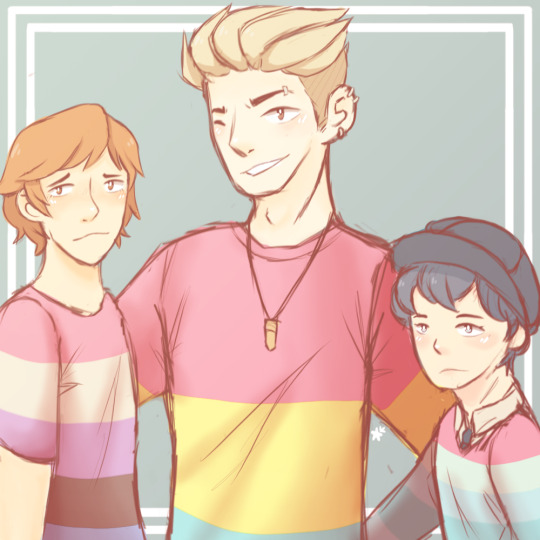
#Kanji Tatsumi#naoto shirogane#yosuke hanamura#p4 yosuke#p4 naoto#p4 kanji#Persona 4#persona 4 golden#p4#p4g#lgbt#lgbtq#gender identity#sexuality#headcannons#persona 4 headcannons#opinion#opinion piece
104 notes
·
View notes
Text
Invader Zim: Taller Tales of Terror - The First Fic That Wasn’t
This was going to be my first fanfiction that I ever published, but things came up and I found other story ideas and fandoms to get into. However, because there’s nothing I hate more than leaving a story untold and forgotten.
So like a writer jilted by a big name studio working on a big superhero movie that went terribly wrong after they left, I’m going to share it with you good folks to see if you still think there’s hope for it in some capacity. If so maybe I’ll choose to revive it in some capacity, or one of you kind folks can adopt it. Whatever you think of the once untold tale I’m about tell you, I hope you enjoy it.
The fic would have been either a mini-series/anthology or a movie-esque sequel—or two—to Enter the Florpus.
It would have followed the stranger further misadventures the kids would go on as teenagers, all of which have at least something to do with getting taller, literally or metaphorically.
Although I'd do my best to recreate the series' darkly comic tone, there'd be more to the story than just that. I'd like to do a sort of character study with my fanfics and explore what they would do as they got older, how they would change if they could change, if they'd mature and try to connect with each other more, or if they really do just hate each other. It'd be like a coming-of-age story but done in the style of Invader Zim.
But don’t be fooled, folks! It's not going to be one of those big dramatic fanfics with high stakes (nor any smut) thrown in. At it's core it's still just a fun, dumb, mildly disturbed "What if?" sort of fic. There would be a bit more emphasis on character and plot than normal, because I do love me a good character-driven plot, but still plenty of room for (what I hoped would feel like) the usual weird dumb creepy fun that original series excelled at.
The story is set in basically the same continuity (or at least the closest thing to a continuity that can exist in Invader Zim) as the show and comics. The only difference is that the Battle of Meekrob actually happened—but not really.
Long backstory short, there was a big showdown between the Irken Armada and the Meekrob-allied Resisty, but Zim and Dib missed it because a food fight got them stuck in detention. Zim tried to get Skoodge (who was rooming with him at the time because the scrapped Season 2 episodes were sorta canon here) to cover for him until her got there, while Dib tried to get Gaz to take Tak’s ship to provide support against the Irken. By the time they got out, however, the battle was over, Gaz blew the whole thing off to get a new game, Skoodge and some other Invader became the war hero Zim always aspired to be, and The Almighty Tallest decided to cancel Operation Impending Doom 2 because after the big exciting space battle they felt like they couldn’t top anything after that. Suffice to say, Zim took it pretty hard. Dib however would have seen this as something of a win since Zim still failed in a sense. Albeit it was a very anticlimactic win, even to him.
The actual story would have taken place about 5 years after the Battle of Meekrob, where Zim, Dib, and Gaz have made it to high school (or “hi-skool” as this is the Invader Zim universe, after all). Setting wise, things haven't changed much but the characters have made a few surprising or not-so-surprising developments. The most important of all, so important that it would be the focus of the entire story, in fact! would have been Zim developing a brand-new disguise utilizing an exoskeleton, based partially on the Almighty Tallest, in attempt to make him look like a normal teenager AND impress superiors. Naturally, things go horribly yet amusingly wrong for everyone involved.
Now just where and what has everyone been up to/going through in those five years? Here’s a rundown:
-Zim spent those 5 years obsessing over his crushing failure, begging the Tallest to give him another chance, which they refused every time. Being stuck on a planet of smelly, stupid, and increasingly annoying creatures for so long without any real victories has left him bitter and frantic with more shmoopiness than usual. Even the little "VICTORY FOR ZIM!" moments he used to have got harder and harder to come by. By the time he reached high school, he was so messed up he didn’t realize his classmates had all had growth spurts until Dib easily overpowered him in one of their petty fights and points it out to the whole school. Thus, leading to the new exoskeleton and subsequent schemes to redeem himself in the eyes of the Tallest while looking normal in the eyes of his human classmates. Unfortunately, due to his desperation and general lack of understanding about the human body, the exoskeleton comes out looking like a lanky robotic nightmare with clawed fingers that jerks around like a big cybernetic marionette.
-Dib meanwhile has been doing slightly better. He and his paranormal research are still looked down upon, but he's persevered through the hope that someday he'll prove he's right. After (indirectly) stopping Zim from joining the Battle of Meekrob, Dib got a small confidence boost, thinking of it as a big step to exposing for Zim real now that he’s effectively trapped on Earth with him now. Although, following a rather blunt intervention from his family, he's started thinking about what he’ll do with himself once Zim is gone. He still hates his guts and he's still hellbent on beating him, but he's also started getting out more and trying to socialize more—however awkward his attempts may be. That he's also gotten taller and his head isn't quite as big compared to the rest of his body has been good for his self-esteem too. But make no mistake—when he's not going for runs, working shifts at his dad’s lab, or looking into a “totally normal” science major, he's toiling away on improving his array of anti-Zim strategies and defenses.
-Gaz is doing pretty good but she is totally done with Zim and Dib's junk. Although she's still her old apathetic self, she's doing everything in her power to broaden her horizons so she doesn't end up in the same, stupid rut that they ended up in. She would have gotten into indie art and game development; although her work is still fairly obscure, it's quickly gaining attention for it's macabre, edgy, punishing and geeky nature. (Imagine the works of Jhonen Vasquez, Toby Fox, Hidetaka Miyazaki, and Hideki Kamiya mashed together.) She also participates in e-sports tournaments on occasion, if only because crushing countless so-called “gamers” brings her amusement. Her psychic powers have also gotten stronger with her age, and she likes to experiment with them whenever she can—usually when somebody really annoys her. She's doing fine in the story until, after a run-in with a certain unkillable spoiled brat at an e-sports tournament, sends her over the edge and she trashes the place in a Carrie-esque episode. This gets her sent to anger management therapy, and now she's trying to find a way out to avoid sitting through an endless slog of "sappy" sessions.
-Gir would still be insane.
-Minimoose would still be the ultimate techno-lifeform Minimoose.
-Zim's Computer is still tired.
-Prof. Membrane is still the greatest and most powerful scientist who ever lived but he’s also trying to make time for his family more and mentoring Dib to be the successor to his legacy he always thinks he was meant to be. That is if is experimental new immortality machine doesn’t work out. May or may not have to fend off Clembrane whenever he comes to visit.
-The Almighty Tallest are still living content, tyrannical lives. They didn't take canceling Operation Impending Doom 2 very hard because, as it turns out, they just got bored with it after a while. (Of course, Zim's repeated interference didn't help keep their spirits up either). However, they'd come up with the perfect plan to obtain absolute control of the universe AND get the feeling back: by making Operation Impending Doom 3 a thing and setting up a huge hype campaign for it. Thing go pretty well for them until Zim calls them and tells them about his new exosuit. They believe that Zim is trying to make himself look like a Tallest so he can lead a rebellion against them and get revenge for treating him like garbage. (He's not, obviously, but they're too dumb and paranoid to realize this.) So, they pretend that they're ok with it and let him carry on his merry way while they figure out how to dispose of him without making him look like a martyr figure of some sort, thus giving the other Irkens they mistreated any ideas.
-Tak would show up again in the second half and this is where it gets spoiler-y. She would come to Earth on the Tallest’s orders with a squad consisting of a reformatted Mimi, rogue SIR units, as well as Tenn and Skoodge who she had recruited to aid in her vendetta against Zim. She would subsequently reveal that after drifting through space in an escape pod, she crashed landed on Meekrob just as the battle was about to begin, and using the element of surprise, rescued Tenn from captivity and assisted Skoodge and the Tallest in devising a battle strategy so brilliant that it crushed the Resisty and Meekrob’s alliance and earned her the status of Irken Elite. She grew comfortable in her new position but could never get over her fear that Zim would eventually ruin it all again, so she waited and prepared for the day she would strike back. I don’t know how or if she would adopt an updated disguise (perhaps a hologram of her older humansona projected over her, Tenn, and Skoodge standing on top of her shoulders?) or hide in the shadows while Tenn, Skoodge, Mimi and the berserk SIR squad did her dirty work.
-Skoodge would have gone from aspiring to be Zim’s friend to being his worst enemy after Tak turned him to her side by digging into his past with him, making him realize how little his supposed old friend cared about him. Despite this he still keeps an unusually cheerful disposition—even repeatedly apologizing to Zim whenever he attacks him—and acts as the heart of Tak’s squad. He thinks of them as his real friends, so he always goes out of his way to help them out or keep the energy up. Even though Tak looks down on him because of his size, she appreciates his gullibility and unquestioning loyalty. Tenn just thinks he’s nice, especially since he’s good at keeping the SIRs in check.
-Tenn has recovered from the traumatic escapades she endured on Meekrob at the hands of the rogue SIR units and imprisonment under the enemy, returning to her usual competant Invader self—something Tak values quite a bit in an armada largely composed of egomaniacs and morons. Tenn values Tak’s companionship even more, viewing her as a conquering hero who not only won the most important battle of Irken history, but also, her heart. …Not she’ll ever act on her feelings. That would inconveniance the mission! (Although Skoodge has picked up on this and gladly supports her, thinking they’d make an adorable couple.) After investation revealed that Zim was supposed to receive the rogue SIR units instead of her while he trashed the Megadoomer that was rightfully assigned to her, she bought into Tak’s view that Zim’s very existence was a threat to all Irkenkind, gladly assisting her efforts to eradicate him.
-Mimi and the rogue SIR units have been reprogrammed to be less insane and follow orders again thanks to Tak and Skoodge’s efforts. However, Tak also had a berserk mode installed specfically for eradicating targets with optimal, brutal efficiency. Mimi still tends to glitch though. In addition to Mimi retaining her cat holo-disguise, the berserker SIRs would gain new disguises resembling either feral cats or rabid teacup poodles. (I hadn’t decided yet.) Tenn still gets anxious around them.
-Gretchen might show up again and would possibly get to reconnect with Dib, maybe even finally be honest with him about her feelings for him when she surprises him with her surprising new position at Membrane Labs: the janitor.
-Keef will… er, uh… actually, don’t get your hopes up.
Well, I think that’s everyone important. Okay back to the plot now!
So, right up front, the biggest part of the plot as well as the biggest reason why I got uncomfortable with the whole thing was there wiould be some romance in here between a few couples and that it would have figured into the plot. The most significant of all: ZAGR (a.k.a. Zim and Gaz Relationship). But I wanted to make it feel organic and even sweet without sacrificing the feel of sardonic madness but also keeping it in the wholesome zone.
I always felt like Zim and Gaz were a natural fit for each other (like quite a few other people, admittedly) because I always felt like their personalities were a good fit and they could have a lot in common. The story would follow them as they unexpectedly developed a romantic friendship, bonding over their resentment of the Earth and humanity, their absent family members, a love of technology of questionable intent, and subjugating those who anger them. It would all start with Gaz agreeing to help Zim improve his suit and his unassuming human act just to get back at Dib for annoying her. At first they’d be acting entirely out of spite and necessity, but as they spent more time together, they’d start to enjoy each other’s company more.
Gaz would be the first develop feelings, since she voluntarily rejected the concept of love instead of being programmed to reject it like Zim, as she slowly realizes how much they have in common—much to her horror. Zim would take more time but when he begins to understand how he feels about and just what these DISGUST feelings are, he’d handle it just as poorly. (e.g. I pictured a scene where Zim has such a hard time admitting his feelings for Gaz that he ends up vomiting black goo like he’s possessed or something. For comedy of course.) But they’d both start to open up to each other in the end, if only because they’re the only two people in the universe they can stand. Gaz would try to help him overcome his anxiety and stop caring as much about what humans think of him, while he would be someone that she can actually relate to.
Dib, however, would take sincerest offense to it. He’d be totally freaking out, nearly diving off the deep end to put his plans to defeat Zim into action and expose him before he could be exposed. He’d also make a point of demanding what Gaz could see in a monster like him, even reminding her of everything that Zim had done. Probably in an exchange like this:
DIB: He stole our organs! He tried to crush the planet with Mars! He kidnapped me and threatened to turn me inside out! He tricked me into helping him teleport Earth into outer space so his rulers could destroy it! He turned me into bologna, Gaz! (*holding back tears*) BOLOGNE!
GAZ: I thought you got over that.
DIB: Well, physically I did, yes, but not mentally.
Gir would be pretty on board with it though.
The other biggest plot of the series would have been Tak’s return and the reveal of her and the Tallest’s master plan to destroy Zim once and for all: kick off Operation Impending Doom 3 by placing Zim on trial, executing him, and completing Tak’s plan to turn the planet Earth into a snack bowl for the Tallest (which she still insists is a good plan, she just never got to complete it) big enough to feed them while they watch the conquest of the rest of the universe in style. Zim and the Membranes get through to her and her squad, and possibly the other Irkens, by turning them against the Tallest to stop the Irkens once and for all. Maybe.
Finally to wrap this little nightmare up, here’s a vague outline of the stories I had planned for this wannabe whopper:
-A Whole New Nightmare – Following an amusing prologue about how Zim and Dib ended up missing the battle of Meekrob, Zim finally realizes that his natural Irken height threatens to expose his façade to all the classmates who have reached proper adolescent human height. He creates his exosuit then proceeds to cause a scene when he calls the Tallest and goes to hi-skool. Meanwhile, Gaz bugs Dib about still wasting his time bullying Zim. Zim then challenges Dib to a contest of normalcy: a series of challenges that are just overhyped normal teenage things like loitering, hanging out with friends, and finally a dance-off. Whoever loses has to admit they’re a complete weirdo and admit they’re most embarrassing secret. Dib wins the first round, but after he blows off Gaz to hang out with the other kids, she and Zim strike up a nice conversation and he wins the second round. The final dance-off ends in a draw when Zim and Dib both end up looking like total dorks. The story ends with Dib and Zim standing up for themselves against their judgemental peers, but Zim ends up overtaking his big speech and convincing his classmates to completely forget about his bizarre new appearance.
-Gaz the Befriended - Zim and Gaz make a deal: Gaz helps him fine tune his suit while posing as his "NORMAL HUMAN!" friend, and in return he helps her figure out how to control her powers while posing as her friend so she won't have to go to anger management counselling. While they do drive each other nuts, they eventually learn they have a lot in common and start acting like real friends. Dib grows suspicious of their "friendship," sets out to uncover the truth.
-They Follow - Dib goes on social media to share his findings on Zim with the world in an attempt to verify all his evidence via wisdom of the crowd. Zim finds out and retaliates by joining social media as well to make himself look like a hard luck case in an effort to gain sympathy from the (basically ignorant) public. As their war of words escalate and their follower bases grow, they end up starting a flame war that threatens to destroy society itself.
-Star Dib - Hoping to find some real help, Dib sends a message to outer space looking for reinforcements. He ends up with what remains of the Resisty, who dissolved after their crushing defeat on The Battle of Meekrob. Taking pity on them, he volunteers to become their new leader. Shenanigans ensue on a galactic level.
-C for Conspiracy - Dib stumbles across a mysterious conspiracy involving Earth tech being backwards compatible with alien tech. He wants to take it on himself, but realizes that he might actually need Zim’s help. So he has to swallow his pride and ask him for help, and as if that weren’t enough he has to put up with his and Gir’s (who tagged along) antics.
-Night of the Living Prom-goers - Prom night comes along and all the hormonally-imbalanced kids are ready to go, except for Zim, Dib, and Gaz. Until Gaz works up the nerve to ask Zim out, which he actually accepts. While Gaz prepares for her perfect tolerable evening, Dib desperately tries to convince her that Zim’s up to something while trying uncover his true motives, only for her to snap at him and challenge his views on Zim. Little do either of them know, Zim plans to use the prom as an experiment to harness Gaz’s power for his own ends. But at the same time, he ponders whether his friendship with Gaz is just a means to an end or something more. Either way it will be a night they will never forget. Or survive! Probably.
-The Return of Tak’s Revenge Rises - Tak finally returns to take her revenge on Zim and the Membrane siblings. Striking them when they least expect with the aid of an upgraded MiMi, a squad of berserk SIR units, and two fellow invaders Zim had wronged in the past.
-Doomed Together - Following Tak’s strike, the Almighty Tallest kick off Operation Impending Doom 3 with a mission of utmost importance: sending in the Irken Armada to ensure Zim is destroyed once for all so they can finally proceed with absolute universal domination. Now, Gaz, Dib, and some unlikely allies must come up with a plan to save their even more unlikely new friend and the rest of the universe from the most fearsome force in the universe! It’s basically the grand finale.
And that is all there is, or was, to Taller Tales of Terror. I can’t guarantee I’ll ever revisit it, what with all the other stuff on my plate right now, but I’m glad to have finally shared the story of my first fanfic with y’all.
So, tell me, my filthy monkey maggot mutual friends. After all that horrible rambling, what did you think?
#invader zim#taller tales of terror#iz fanfiction#iz fanfic#iz zim#zim#iz dib#dib#iz gaz#gaz#prof membrane#dib membrane#gaz membrane#iz tak#tak#iz tenn#tenn#iz skoodge#skoodge#iz gir#iz minimoose#gir#minimoose#iz gretchen#zagr#writings of the critter#critter fics#ramblings of the critter
14 notes
·
View notes
Note
Unfortunately, if Sunrise makes Sessrin canon, it won't bring much issue to them, the japanese fans love this ship, and in Japan there's this whole lolicon culture, 10 year old idols and schoolgirl pin-ups which are also accepted there. I still can't believe Japan doesn't see any issue with child grooming and exploiting underage girls, and seeing the series that put a mark on my childhood going through the same direction, makes me sad and concerned.
Howdy, nonnie! Happy weekend. 😚
Even though there are many Japanese fans out there who are antis like you and me, I'm well aware of the fact that there's an overwhelming number of fans there who not only celebrate this ship but are quite fanatical about it, too.
Of course I acknowledge that culture plays a role in how people learn to perceive certain relationship dynamics as they grow up. Their fans appear to think we're naive on that matter, but obviously we're more than familiar with Japan's infatuation with lolicon. Why else would we be so enraged over this ship in the first place? Because of shipping wars?! How many times must we repeat that this goes beyond petty fandom squabbles. This is about real life, and this is about protecting our kids and their future. Tell me, what could be more important than that?
What some of their fans fail to realize is that culture shouldn't be the only deciding factor we take into account when determining right from wrong. Culture isn't the ultimate form of defense either, and it's unethical to use it as an excuse to justify glorifying the sexualization of underage girls. It's ridiculous to believe that culture is "above our morals" so to speak, as if past and present cultures haven't tried to pass off messed up ideologies as mere differences of opinion.
At first glance it may not appear to some like it's a serious issue because "it's just fiction," which must mean people putting this content out there can get away with it then, correct? Oh, well sure they can since they've already been doing so for the longest time! The thing is just because it's "acceptable" and has been around forever doesn't make it right.
I urge you Sessrin shippers to please reflect on that for a moment and try and imagine what the future holds for our children if we persist in normalizing these harmful tropes where girls continue to be placed in highly inappropriate sexual contexts. How do you think putting a positive and romantic spin on a relationship like that will bode for them if they were ever to encounter a situation resembling it in real life? I know it's not exactly the image any of us want to picture, but can't you at the very least admit it's a possibility that a child/teen may potentially mistake a predator's intent as romantic because of what they've been exposed to in the media? I'm not saying that's proof every single child will be susceptible. But truly consider this: isn't one child risky enough?
It's engrained in girls at an early age, especially in places like Japan, that we are but visual appreciations for men AKA what you may know as the "male gaze." It's supposedly natural for men to look upon us women so it should be expected and even sought out. Phenomena like lolicon only take it further by romanticizing it and in turn validating this kind of predatory behavior in society.
Fiction has the power to remove all the questionable and ambiguous areas and focus on the super unrealistic flowery parts instead. But guys, just because a particular culture has found a loophole to portraying a relationship synonymous to real life grooming in a positive light does not mean they can and should get away with it. And especially when we got literal children watching!
Please please please read this short meta on this subject I'm addressing now. I recommend you read the comments section too, because there you'll hear from so many people who can relate with their own personal experiences. It's quite harrowing to see how many of us are out there.
This just goes to prove that it's crucial everyone understands this because we gotta start calling out the people responsible for this content and holding them accountable. That includes the authors, the screenwriters, the animators- you name it! We can't allow these sexualized images of young or pre-pubescent girls to be the norm anymore. I don't care how much it's a part of your tradition, because bear in mind that many immoral things were once tradition.
Now that you've read this far I want you to ask yourself this: Why do you think Rin- a character we've only ever known as a young girl in this series, mind you- is automatically associated with sex right off the bat? I mean, how do we know that she'll even be married or want to be married? Or hell, that she even likes boys?? What if she grows up and likes only women or perhaps both?! Or maybe she's not attracted to either!!
The point I'm trying to make is that we have absolutely no information on adult Rin, and she does not exist as far as we know. I hope she's alive, but what I meant to say is that I don't believe it's been officially confirmed that she's in the sequel yet. (Please correct me if I'm wrong though!) So the real question we should be asking ourselves right now is why are we so concerned with her love life? Why is this ever the only subject of importance in Rin's future? It's not for Sesshomaru but why is it for Rin? Don't you think it's sad that the first thing we as an audience associate a young girl around an older male figure with is sex and romance; like that's all she's good for and as if there's no greater purpose for her to serve.
We really oughta stop perpetuating these demeaning and inaccurate beliefs of what a woman's life should amount to. This idea that Rin doesn't want anything more than to be with Sesshomaru wherever he is no matter what completely diminishes her character to nothing more than ironically enough that little girl he once traveled with. Essentially the only reason you're aging her up is so she can have sex with him, but you still expect her to have no agency and follow him around blindly. A child may do that but not a full grown woman. Nope, not even in feudal times.
What that basically tells me is that you believe her character growth is non-existent and she's only in this story to serve Sesshomaru's plot and never her own outside of him. He needed to learn to think of others besides himself? Rin did that! He needs romance now? Well, that's what Rin is there for!! To satisfy his every need. Because apparently his character development only extends to her and her character's significance doesn't go beyond him.
Wow, such an honor to be reduced to nothing more than some pretty little sex object. But as long as Sesshomaru is happy then I suppose that's all that matters, right?
I could go and on, but best I stop. Lol Thanks again for the ask, nonnie. Here's hoping one of our favorite childhood memories will be salvaged! 2020 has already been shitty enough as is. 😆
29 notes
·
View notes
Text
Dead Poets Society: The Characters
No matter how good a story is, how great the cinematography, or how subversive the genre-usage, a movie cannot stand without use of characters.
Characters are perhaps the most vital element of any story ever told. An interesting plot helps a movie greatly, but without a use of compelling characters, it falls flat on an audience who doesn’t care about the well-being of the people pushing the story forward. Viewers need flawed, interesting people, moving the story and trying to overcome conflict, in order for a movie to feel satisfying.
Fortunately, Dead Poets Society has no shortage of flawed, interesting people.
Today, we’re going to be taking a look at some of them, starting with our protagonist: Todd Anderson. (Spoilers below!)
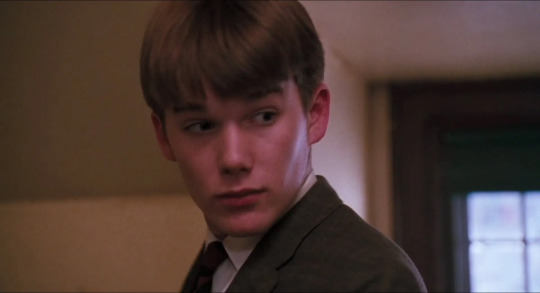
Todd is introduced as a character many of us can understand immediately: he’s the new kid at school, the younger sibling of a big-shot. Todd is part of a legacy, his older brother held in high esteem at Welton, and Headmaster Nolan seems to immediately put great stock in the fact that Todd is another Anderson. Todd is living in the shadow of greatness, pressured to fill the same position as his brother, or fail.
On top of that and clear parental favoritism directed at his brother, Todd is a naturally nervous, shy person. He’s quiet, withdrawn, the total opposite of his roommate, the outgoing, laid-back Neil, and the two continue to contrast each other throughout the whole film.
Shy characters as protagonists aren’t completely unusual, and can, in fact, be kind of hard to pull off, to the point where audiences don’t always realize that they are the protagonist. They run the risk of being mistaken for a supporting character, or dismissed as ‘not strong enough’ to carry their own story, and indeed, it can seem like this is exactly what happens to Todd.
For most of the film, it can be very easy to be under the impression that Todd is not the protagonist, rather that he plays a supporting role to Neil. However, on a closer inspection, the truth becomes clear:
Todd is the one who is doing the growing and changing.
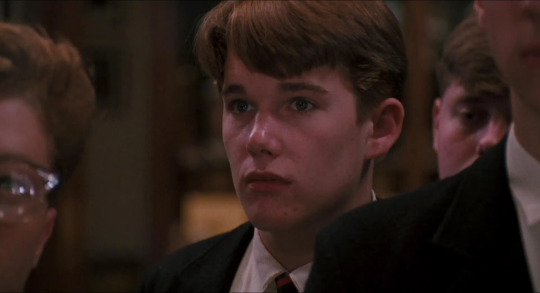
Throughout the film, the audience witnesses Todd grow into his own as a poet, following his journey as he learns to speak out. Todd is the main beneficiary of Mr. Keating’s English class, the one who takes his lessons to heart and lives them out in the best way.
As I’ve mentioned before, every protagonist has to have a problem, and early on, it’s easy to see what Todd’s problem is: He’s the Un-Favorite, on the receiving end of Always Someone Better. As he says to Neil:
“I’m not like you, all right? You – you say things and people listen. I’m – I’m not like that.”
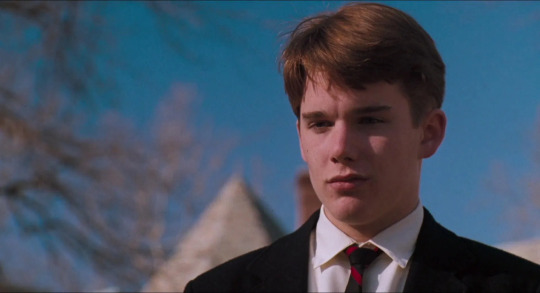
Todd’s Problem is that he is living in the shadow of everyone around him, and as a result, has to struggle to find his voice.
And it is a struggle.
Todd is practically dragged into the Dead Poets Society revival, under the condition that he doesn’t have to read out-loud. He’s terrified of speaking in public in general, and it is when he is forced into the situation by Mr. Keating that a transformation begins to take place.
In many films, (and stories in general) the Aha! Moment is an important one for a protagonist. It is the moment that sparks change, that signals growth beginning. For Todd, it is the scene where Mr. Keating forces him to create a poem on the spot, in front of the entire class.
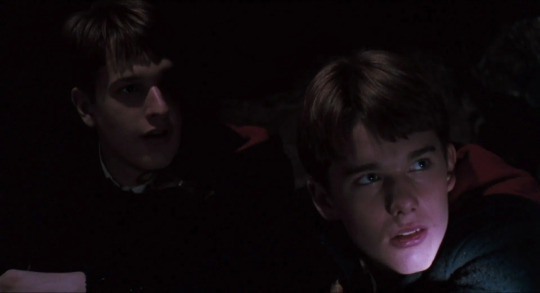
Whether his poem is ‘your thing’ or not, the moment is crucial to Todd’s development: he becomes a poet, something different from his brother, and begins to grow out from under the shadows, into his own person. Through Mr. Keating’s class, and his friendships with the other boys, especially Neil, Todd finally shows some backbone.
Until tragedy strikes.
In moments like where Neil helps Todd laugh at his family’s pressure on him (with the flying desk), Todd’s more confident side starts to emerge, slowly becoming more outspoken, until Neil’s suicide. Completely broken by it, Todd runs off into the snow, and when he returns, he’s very much like he was at the beginning of the film: quiet, nervous, and unwilling to speak out, most notably when he’s questioned by Headmaster Nolan.
But he doesn’t stay that way.
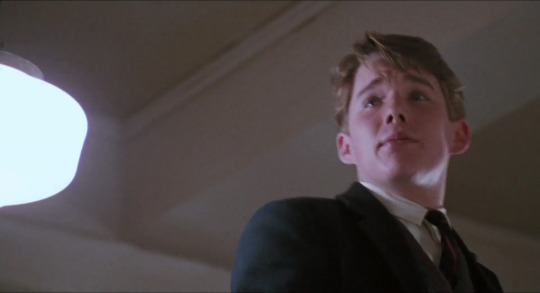
When Mr. Keating returns to the classroom one last time, Todd finds his voice again. Unable to remain quiet any longer, Todd becomes the leader, filling in Neil’s place, leading a few of his classmates against the grain, standing up for himself and his teacher, informing both Mr. Keating and the audience that Todd will not be living under a shadow any longer.
This is Todd’s ‘dragon slaying’ moment, his ‘hero’ scene. Throughout the film, we see him grow and change, which protagonists are supposed to do, and finally, at the end, we see him overcome his internal obstacle, becoming a stronger person for it. At the end, the audience feels satisfaction, even if the consequences for his actions may be unfortunate, because he did the right thing and proved himself a heroic character, fulfilling the arc set in motion the moment he created an improv poem and realized he was good at it.
Unfortunately, not all characters get even this bittersweet ending.
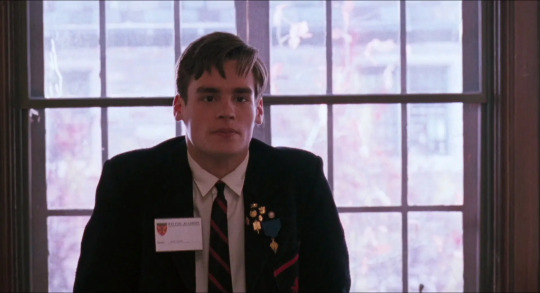
Much like Todd, Neil Perry is the subject of high expectations. Headmaster Nolan is seen early on telling Neil how high his hopes are for him, and instead of Neil answering, his father announces that Neil won’t let him down. Even in the first few minutes of the film, it’s easy to figure out what Neil’s problem is: his father controls his life as though it were his own.
Both Neil and Todd are both introduced speaking to Mr. Nolan with their parents, instantly setting up the pressures put on them by both the school and their family, establishing their common ground immediately.
As I’ve mentioned before, Neil is set up as an instant contrast with Todd, with one exception: When Neil is around his father, he essentially becomes a version of Todd, subdued and quiet. Around every other character, Neil is the life of the party, further emphasizing the extreme reaction he has to his own family.
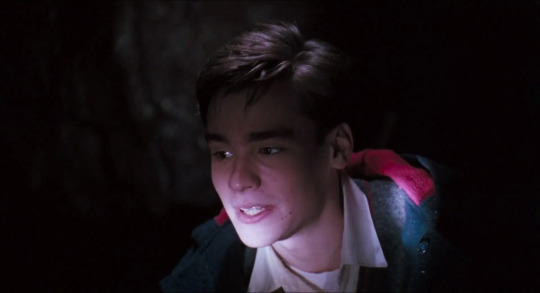
And it’s not on purpose.
Neil wants to talk to his father. He wants to explain his passion for acting, and his frustration with his life being controlled and pushed in a direction that Neil has no interest in, but unfortunately, he doesn’t know how. His father shuts down any conversation direction that he doesn’t approve of, and makes sure that Neil cuts out everything that isn’t directly linked to the plan that his father hasn’t already set out for him. Neil feels completely trapped in his role as the ‘dutiful son’, unable to break free in a way that ends happily for him.
Neil’s relationship with his father is extremely jarring in comparison with his role in the rest of the story, as I mentioned earlier. He’s a natural leader, the first to be on board with Mr. Keating and his unorthodox teaching styles. He throws himself into the new English class, loving the chance to take the lead by reviving the Dead Poets Society. He drags Todd into it, as well as the rest of his friends, because again, Neil is a leader, and he’s finally found something he wants to do. As he tells Todd:
“For the first time in my whole life, I know what I want to do…and for the first time, I’m going to do it! Whether my father wants me to or not. Carpe diem!”
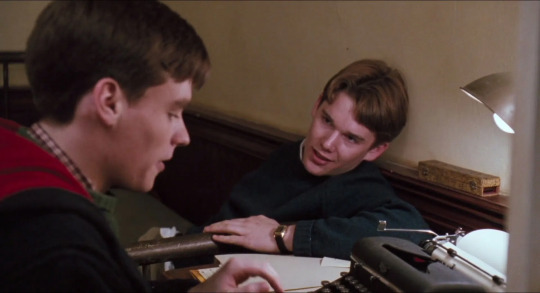
Neil wants to live his life to the fullest, to seize life and make it extraordinary, as Mr. Keating suggests, giving him confidence. But again, his confidence deflates when confronted with his father, even after a successful performance proving his abilities as an actor.
He doesn’t put up a fight, knowing it’s useless. So after his father shoots his dreams down, Neil shoots himself, with his father’s gun, rather than give up and succumb to a life he doesn’t want.
Until this point, Neil could easily be mistaken for a protagonist, and although he isn’t, his importance is keenly felt through the remainder of the movie, even though he’s no longer there. It is his death that kicks off the investigation into the Dead Poets Society, that sends Keating into a spiral of depression and his classmates into confusion. Welton, aware of the scandal that could emerge, shuts down any non-conformity, bringing it back to status quo, giving Todd the opportunity to buck it for the right reason, picking up where Neil left off. Neil was left as a tragic inspiration, and his imprint is necessary for the film to work as an emotional, impactful story.
But neither Neil nor Todd would have been able to change anything about their lives if not for the teacher himself.
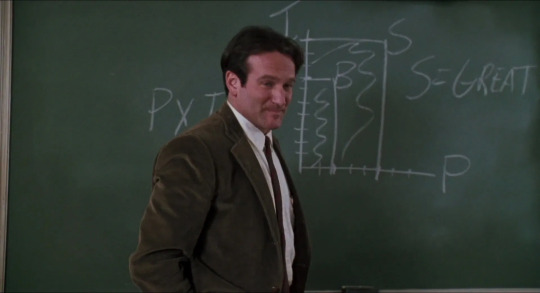
Mr. John Keating is the quintessential Cool Teacher, and a Blithe Spirit, a foil to Welton’s traditionalism.
Keating is actually from Welton, which may explain his zest for changing things up. He takes his students from their classrooms, showing them new ways to interpret poetry, yes, but also life. “Seize the day,” he tells them. “Make your lives extraordinary.”
He’s an outsider among the faculty at Welton, clearly looked down upon for his methods that are considered disruptive. He argues with them, explaining that without dreams, without free-thinking, there’s no point to life. He wants these boys to think for themselves, to become their own, best versions of themselves. It’s a noble enough goal for this Reasonable Authority Figure, and yet…it doesn’t work out.
But it’s not for lack of trying.
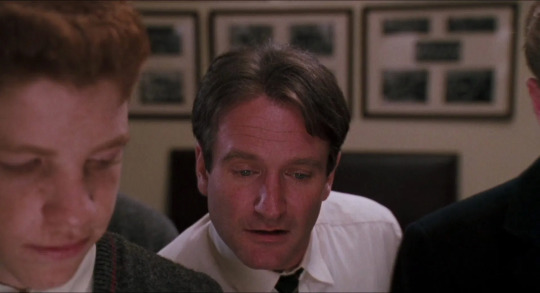
Keating is a father to his students, dispensing wisdom that goes beyond ‘rebellion is cool’. On the contrary, he actually advises a few of his students to not rebel, or at least, not go that far, especially just to do it. He may be blithe, but he’s not stupid, and he knows his students aren’t, either.
He teaches them about poetry, love, and life, and he wants the boys to live their own lives true to themselves. He teaches them to look at everything from a new perspective, and that it’s okay to be an individual, but he also tells them how to do it safely, by living out his own values as well as explaining them.
What’s important to note is that, while it seems the boys’ tragic outcomes are linked specifically to Keating himself, as a matter of fact, Keating’s advice is always solid, and usually ignored, ironic, considering that the boys wholeheartedly embrace him as their ‘Captain’. His advice to Charlie about when to be daring and when it’s just stupid falls by the wayside after Charlie decks Cameron, getting him expelled. His suggestion that Neil speaks to his father and tries to explain is similarly ignored, as Neil feels he can’t.
Even worse, despite the fact that none of this is his fault, he feels like it is.
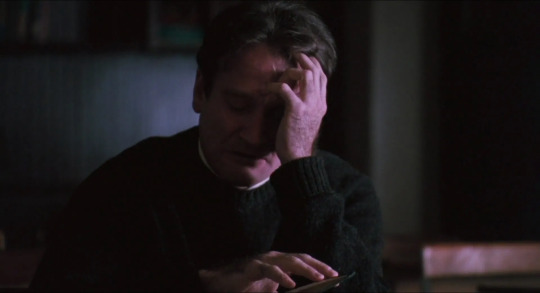
Keating clearly feels responsible for Neil’s death, for encouraging him, shown by his breakdown in his own empty classroom. He’s tried his best to improve these boys’ lives, and he feels that he has failed in every way, sending him into a depression as he is fired, only lifted by one final act of his remaining students.
As Todd leads a few of the boys, standing on their desks and shouting out: “O Captain, My Captain”, they tell him with those words that they will not forget him, that his teaching hadn’t been in vain, that it had meant something, that he hadn’t failed them. It is in that final act that Keating feels redeemed, and that his attempts to teach the boys something important had meaning.
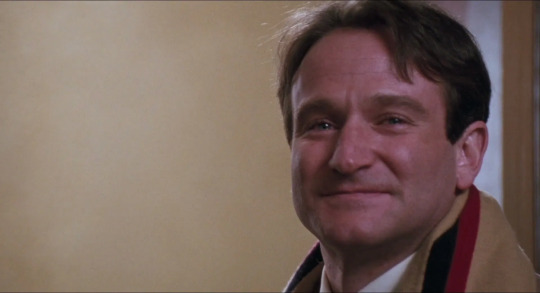
And more than just Todd took it to heart.
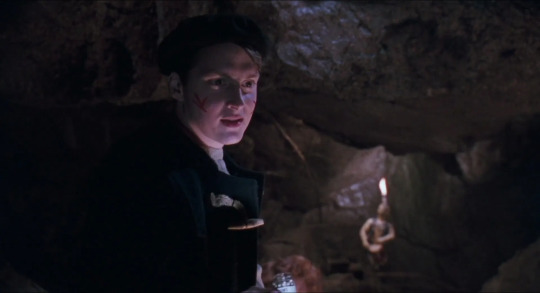
Charlie Dalton, a classic Class Clown prankster, was one of the boys who took to Mr. Keating the most zealously. A mischief maker to the core, he’s not dumb, but he is reckless, Hot-Blooded to the point where it can get him in trouble. He can come across as a bit of a Jerk with a Heart of Gold, brash and excessively rebellious, but good-hearted under it all. He’s free-spirited before Keating comes on the scene, and as a result, really takes off under Mr. Keating, albeit needing some guidance in order to do it right, in a way that’s daring, not stupid.
Granted, he does screw up. But after he screws up, he takes ownership of it.
Charlie’s loyalty is unquestionable. Even after disciplinary actions taken by the school, Charlie refuses to sell out the rest of the Dead Poets, and in the end, after Cameron does sell them out, Charlie’s hot-blooded nature results in an action that ends with him expelled from the school. A bittersweet ending, for sure, but there’s no question that he’d rather that than betrayal.
As would Knox.
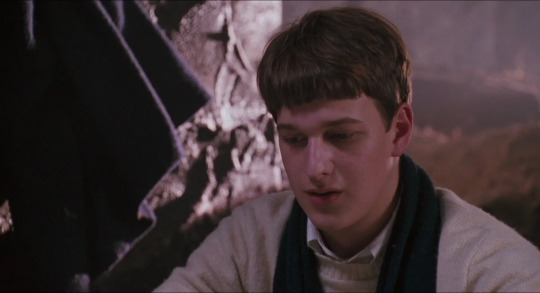
Knox Overstreet is very much a Charmer wanna-be, a Stalker with a Crush to Chris, a girl he meets early on in the film and who he is determined to woo. Most of his individualism in the cast comes from his totally love-struck behavior after meeting Chris, as beforehand, he’s kind of just one of the guys. After falling in unrequited love, however, he takes on a hugely individual personality among the boys: extremely dramatic.
His growth in confidence from the Dead Poets Society and Mr. Keating leads to him pursuing Chris, despite all signals that he probably shouldn’t, ranging from her having a boyfriend already to her literally telling him off. Although he definitely goes a bit far, Knox becomes a very passionate, determined young man, and finally does end up winning Chris over to him, and overall possibly ending up better for it.
Which is more than we can say for Cameron.
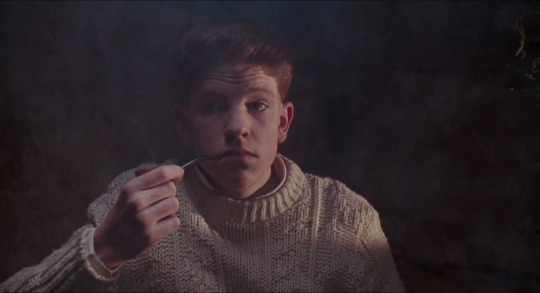
Richard Cameron is a Dirty Coward to the core, very much the Friend Nobody Likes. His concern is tradition, the status quo. He doesn’t want to tear out the pages of the books, and he clearly doesn’t enjoy Mr. Keating as a teacher. He’s skeptical of the new and unorthodox, a young version of the older administration. Cameron is a suck-up, a Turncoat, the Informant, who turns his classmates over in a heartbeat rather than face any consequences himself. He is the first to tattle to the administration and blame Keating for everything, and he never changes. He doesn’t stand with Todd and the rest. Keating’s teachings have fallen on deaf ears, and Charlie ends the film much as he began it, completely unchanged.
And then, of course, there’s the closest thing this film had to an antagonist: Neil Perry’s father.
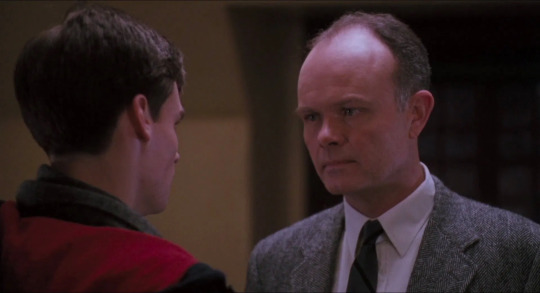
In contrast to Headmaster Nolan, who was at least just doing his job, Mr. Perry is a Control Freak towards Neil for little reason other than what appears to be selfishness. He ignores Neil’s goals and dreams, imposing his own on the boy and acting as though Neil’s life is his, forcing him to give up extracurricular activities and indeed, anything that isn’t directly connected to medical school. He crushes any protest or mild argument, trapping Neil in a cycle of silence and misery, simply because Neil’s goals aren’t in Mr. Perry’s plan.
Mr. Perry views Neil as a vehicle for himself. All of their interactions are based in how Mr. Perry thinks Neil reflects on himself, to the point where Mr. Perry cannot see that he is the cause for his son’s suicide, choosing instead to pin it all on the person that he blames for Neil’s ‘rebellion’.
With all that said, as awful as Mr. Perry seems, his goals are genuinely what’s best for his son. A lack of communication and different values drives the two so far apart that they genuinely cannot communicate. Mr. Perry thinks he has done right by his son by giving him this opportunity, and cannot understand that he needs to consult Neil on what path Neil wants to choose, inevitably leading to his son’s suicide.
None of these characters are black and white.
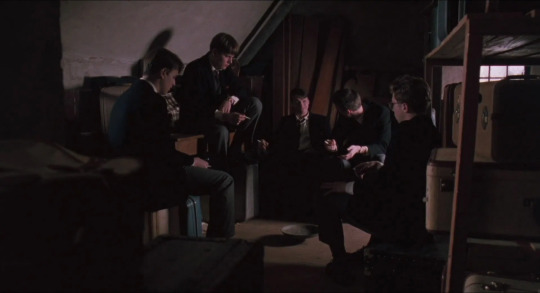
While some are more on the side of wrong than others, it’s interesting the way that Dead Poets Society plays with ideas of rebellion against a system, showing healthy and good ways to do it contrasted with bad ones. These people are shown to us as human as we are, capable of making huge mistakes and having to live with the consequences of them. Every character is here to hold up an idea and ask the audience to think about it, to evaluate it.
The drama of this film is in that there is no clear answer. Extremes in either direction lead to disaster, it is up to each of us to find the middle ground between tradition and individualism, and for each of us, and each situation, that middle road may look different. Through these characters, the film actively encourages thought from an audience to look at each choice made by each person and question if they were right, and if not, what exactly went wrong?
Like many dramas, Dead Poets Society is, if not a realistic film, a film designed to be real, a mirror held to a culture that is constantly wavering between two extremes, asking its audience what to do when we glimpse the systems that we live in. In that, the movie’s characters come across as genuine, confused people in a world with no clear answers.
And more importantly, we care about them.
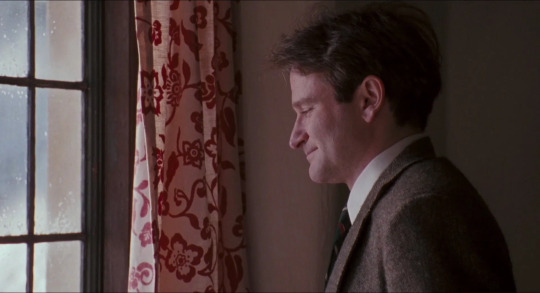
The reason “O Captain, My Captain” has stuck around thanks to this film isn’t just the message, it’s the complex people with motivations and personalities and reasons for being the way that they are, and for wanting what they want. We connect to them instantly for that reason, and we want things to work out for them.
Every character in Dead Poets Society is there for a purpose, to fill out a cast of people with personalities that audiences grasp and relate to, to the point where generations of youth still gravitate towards this film set in a time past. These people and their different beliefs and styles all carry their own stories, making us care about them all.
And in the end, that’s the mark of a good character.
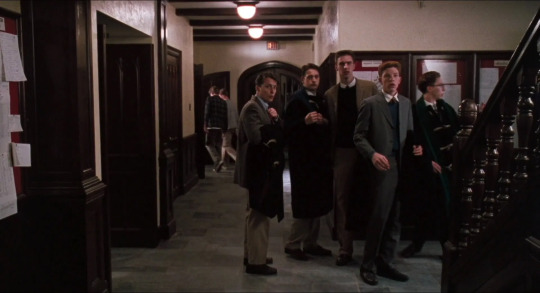
Characters exist to make you care, whether in a good way or a bad way, and with that in mind, the characters of Dead Poets Society more than live up to the task. They leave a strong impact, letting us as audience members remember each one of them, their goals, and how they tried to go about them, long after the movie is over.
We remember these boys, and their teacher, and how they tried to make their lives extraordinary, inadvertently asking us how we’ll do the same.
In the articles ahead, we’re going to be taking a look at some of the other important elements of Dead Poets Society, so if you enjoyed this one, stick around and join us! Don’t forget to leave a comment, like, or some other form of love if you enjoyed it, and follow for more! Thanks so much for reading, and I hope to see you in the next article.
#80s#1989#Dead Poets Society#Dead Poets Society 1989#Film#Movies#Comedy#Drama#PG#Robin Williams#Ethan Hawke#Robert Sean Leonard#Josh Charles#Gale Hansen#Dylan Kussman#Kurtwood Smith#Peter Weir
16 notes
·
View notes
Text
Okay. Well, if I’m being honest, this episode was not the greatest. This is also the first analysis I’ve made for a show, at least that I’m posting. We’ll see how this goes. Strap in, this is going to be long.
I think we have all learned by now that Jamie-focused episodes are never the strongest. I find it a bit ironic that in a show called Jamie Johnson, the least interesting character is Jamie himself.
We finally saw the end of the, dare I say, idiotic Under-13s subplot. The classic “arguing friends are trapped in a room together until they make-up” trope was used to its, not fullest, but decent potential. The greatest part of this episode was the fact that their eighth-grade drama was resolved; that and the ten seconds of screentime Dillon received. Liam continues to prove that he has still not grown. Here’s my analysis of his development:
[I was going to insert a clever chart of his nonexistent growth, but I’m too lazy, sorry. Here’s a paragraph about it instead:]
Liam needs to learn that manipulating people and pretending to have changed is not maturity, it’s being an asshole. He has a terrible father, that’s true, but Dillon managed to change. Nothing has ever truly been at stake for Liam. He’s been able to lie and manipulate others to get out of all the trouble he’s caused. He was given a second chance to play with the Under-13s and has continued to use those around him in order to seem, I don’t know. Big? Powerful? All he has done is made the Three Musketeers dislike him even more. He has done absolutely nothing to earn their trust. I could go on and on about Liam Simmonds, which I suppose proves he’s an interesting character (that’s more than I can say about some people *cough* Jamie *cough*).
Eric learns that Aisha has feelings for him too. Yay! He also learns that Aisha is much smarter and more mature than him, choosing to step back and give him time to be with his friends. Yay? Freddie has been incredibly weird this season. I can’t tell if he genuinely liked Aisha as more than a friend, or if he thought he was supposed to, given how much Eric liked her. This entire storyline comprised of way too much unnecessary drama. Looking at Instagram comments, however, it seems that it was very popular among younger kids. I suppose I am a bit too old to be criticizing middle school relationship drama in a children’s show. Poor Alba was practically thrown to the dogs in favor of a petty love triangle. All of their problems were wrapped up so neatly, it felt a bit uncomfortable. Like they didn’t deserve this ending.
I don’t know if it’s just me, but something about this episode seemed off. When comparing it to other episodes with similar premises, the lack of emotion and genuineness becomes obvious. Take episode 10, for example, there were many (and I mean many) subplots. It was a little all over the place. And yet, the end of the episode left me feeling bittersweet, intrigued, and wanting more. This episode didn’t do that. I am sick of Jamie’s bullshit and tired of this dumb love triangle. Thankfully, the latter is complete now.
Onto Jamie’s storyline:
1) I told y’all Jetpac11 would be Jethro! These are some big brain hours.
2) This boy is supposed to be the TITLE character. His storyline is meant to be the most in depth, the most interesting, and, above all else, the most entertaining. It is none of those things. The stakes are supposed to be high, and they are, but they don’t feel like it? He supposedly lost his place at Hawkstone over a goddamn video game. Why don’t I feel anything except contempt? If not frustration at Jamie, then frustration at Ian, who I suppose I should be used to by now. Everyone says Jamie should know better than to trust him after all he’s done. That he should just listen to Mike. Obviously that’s true, but Ian was on his side, not the other way around. Ian enabled Jamie and allowed him to make a stupid decision, one that has huge consequences. Ian didn’t tell Jamie to keep playing for his own gain, well, kind of. He let Jamie keep playing because he though it would make him happy and regain his trust. It’s the same reason Mike lied to Hawkstone. Both adults displayed extremely poor judgement, Ian just far more so, as always. I must admit that I have zero interest in video games. I also have zero interest in soccer (or, rather, football). Yet this show keeps me interested in the matches and invested in the characters. They have failed at maintaining my interest in this video gaming storyline. Part of this could be because I find Jamie boring and repetitive, or maybe he simply seems that way due to the plethora of vastly more compelling side characters. All I have learned from this is that Jamie is a pretty terrible friend, a poor judge of character, and impulsive. These are all faults he has had since season 1, except he used to be a genuinely decent friend. He has grown more self-involved and one-sighted (and one-sided, as in one-dimensional, or you could take it literally, seeing as one leg is currently out of commission). I get that he was hit by a car and his leg is broken. He doesn’t see a future in soccer for himself anymore. Mike is right, though, he should be focused on getting better and being able to play again. I don’t even like Mike most of the time -- I honestly find him fairly annoying, although this may be due to the acting -- but he is the only sane one in the Johnson family right now. Both of Jamie’s parents are enabling him and Mike has too, though only for around an episode and a half. I am so happy this storyline will be resolved next week. I am sure we will still be left with a cliffhanger at the end, as with every season.
Dillon also got a bit of screentime in this episode (wow, a whole twenty seconds!). I really do like the way the writers are portraying how conflicted he is. He is torn between living a lie or risking his future as a professional player. I understand why they introduced Elliot. He was Dillon’s first crush and I think he was necessary for Dillon to come to terms with his sexuality. Where they messed up with Elliot, however, is by entirely removing him from the show after he fulfilled his purpose of giving Dillon the strength to come out. Just as @mcustorm said, he was a plot device and it was out of character for him to out Dillon. I could probably write a whole essay about how dirty both Elliot and Kat were done. The only way using exclusively Ruby to further Dillon’s storyline would’ve worked was if they kept the whole “Ruby has a crush on Dillon” thing from season 4. Doing that would likely ruin their entire dynamic as best friends and make things awkward. If they had done that and made, say Harry or Michel his first crush, they wouldn’t need Elliot to be Dillon’s first real crush. Although, Dillon was only around 11 or 12, and most real crushes don’t hit until 13-14, at least in my experience. Also if they had ruined Dillon and Ruby’s dynamic, then Dillon would have no real support system. I can’t really see Ruby abandoning Dillon over this, though, even if she had an unrequited crush.
Next week should wrap up both Jamie’s and Dillon’s storylines. It will also be the final episode of season 5! A lot to look forward to and a lot to be absolutely terrified of, not to mention the fact that season 6 production has been postponed for obvious reasons.
TL;DR:
It’s the end of the Under-13s drama! And possibly the end of Aisha, knowing how JJ deals with its newly irrelevant characters.
Jamie is being stupid and probably lost his chances of getting into Hawkstone. Or maybe not, considering he’s the protagonist of a kid’s show. JJ does have a habit of dealing out real consequences, though, so who knows.
Dillon got... something? He’s feeling conflicted, which is entirely natural, especially at this stage in his coming out.
Next week is the last episode! Stay tuned for more, I guess. Let me know if you guys enjoyed this type of proper analysis.
#analysis#this ended up being incredibly long#seriously props to you guys if you made it all the way down here#i actually had a lot of fun writing this#i don't usually write properly on tumblr#it's still not the greatest#i'm not winning any awards for literary analysis#it's also 2 am#if there are any mistakes i'm sorry i'll correct them in the morning#or maybe not#why did i use contractions in this#i suppose it's not truly formal writing#whatever#yes i have a habit of using too many commas#im too lazy to fix the many run-on sentences#okay goodnight#retagging#jamie johnson#because it disappeared from the tags#im kind of uh high rn so im sorry if this doesnt make sense uhhh#kids dont listen to me
17 notes
·
View notes
Text
Brand New Animal...
So, the last few episodes of BNA: Brand New Animal dropped on Netflix Japan last week. I was initially really hyped for this anime—I devoted several hours of my life to translating and summarizing the Winter 2020 Otomedia interview concerning it—so I intended to write a lot more about the series, especially upon a wider release.
But having now seen every episode, this is another Kiznaiver and Darling in the Franxx for me. There’s a lot of potential, and I was incredibly invested at the start, but the narrative quickly goes directions and makes decisions that don’t sit well with me at all.
For those interested in BNA, my (mostly?) spoiler-free opinion is that it’s visually beautiful (especially in regards to its colors), but the story feels scattered, and there’s so little time devoted to positive interactions among the leads that their friendships fall flat. Further, speaking as a very character-oriented person, I finished this anime annoyed at the entire main cast. Their growth comes across as dissatisfying and undeserved.
Of course, it is more than worth noting that my understanding of Brand New Animal is indeed limited at this point; I don’t have much of a grasp on Japanese, there are no official English translations yet, and I watched with Japanese subtitles. (At least until episode 12. While there are thankfully subtitles available now, there weren’t when I watched, which is a huge disappointment in terms of accessibility.)
I recognize that my feelings may very well change if I have a better sense of everything that’s being said. But given what I do know, I—at least at the moment—have no desire to rewatch this series. I’m always open to requests to talk about BNA, but I don’t think I’ll be blogging much about it otherwise.
All that said, I do want to share some spoiler thoughts under the cut. As my sister noted, I am “very upset about this furry anime.”
First things first: I cannot stand Nazuna. I’m sorry. I think it’d probably be too much to say that she soured the whole show for me, but she definitely comes close.
Now, I got a (minor) degree in Women, Gender, and Sexuality Studies, so, yes, I can’t help but wonder if my strong negative feelings are related to sexism. Would I feel so strongly if there were a man in Nazuna’s place? There’s been a lot of investigating myself these last few days, let me tell you.
Still, I can’t say I know the answers. But I do have some Thoughts that are maybe best illustrated with another anime I’ve started watching lately: My Hero Academia.
Do note that I’m only on Season 2, but there are also characters I strongly dislike so far in My Hero—characters who are arguably much worse than Nazuna, as far as their actions and behavior go. Bakugo is an angry, abusive bully, while Mineta sexually harasses women. I hate both of them, but—especially regarding Bakugo—it’s a different kind of hate than what I feel for Nazuna.
Why? Well, I won’t deny the possibility that sexism plays a role, but there’s also a profound difference in how these characters are treated by their stories. Bakugo initially gets away with his bad attitude, but upon coming to high school, he’s a pariah. He’s called out for being a jerk, time and time again. Mineta, similarly, is not adored for his actions. These aren’t nice dudes, and the narrative makes this point clear. Regarding Bakugo, I hate him, but it’s not exactly a bad kind of hate. Because I hate him, I’m rooting even harder for Deku to prove him wrong.
But what about Nazuna? She pretends to be another culture’s god, but much of BNA seems dedicated to treating her as a poor victim who was manipulated into manipulating others and needs to be rescued. While Nazuna’s situation is indeed a frightening one that I don’t at all intend to make light of, episode 6 makes abundantly clear that this girl adores masquerading as a goddess and fails to see any moral problem in tricking thousands of people into believing that she’s their savior.
And that, to me, is absolutely horrendous. Nazuna is not in kindergarten. She is not a small child still in the preoperational stage of development. She is an older teenager. I find it disconcerting to paint her as someone in a rough place who was simply desperate for love when she pointedly relishes her false godhood because it makes her feel like an idol. That is so unbelievably gross and disrespectful.
Of course, Nazuna truly doesn’t see what she’s doing as wrong, and I recognize that she is young. In the end, as I hope the Bakugo example highlights, my issues are really less about Nazuna herself and more about how she’s written and depicted. Just as there’s nothing inherently despicable about portraying a smug, selfish teenage boy in a cartoon, there’s nothing inherently despicable about portraying a smug, selfish teenage girl in another cartoon. But while Deku and Bakugo were also past friends just as Michiru and Nazuna, Deku never defends Bakugo’s awful behavior as Michiru does for Nazuna.
And that bothers me. Michiru—our protagonist and so the person viewers are pushed to empathize most with—never really seems to grasp just how disgusting Nazuna’s actions are. More importantly, neither does Nazuna herself. She’s instantly forgiven, and her dream comes true seemingly without any apology or understanding of wrong whatsoever.
Brand New Animal is filled to the brim with social commentary, but one message that stood out to me actually has nothing to do with the human/animal-human conflict. It’s instead that this cute girl never has to face the consequences of her actions because she’s cute.
I know, I know. This is some pretty over-the-top negativity. But I was so excited for this series. Especially considering the ending conflict around being “mixed” and “purebred,” I felt like BNA was an opportunity for writer Kazuki Nakashima to more thoroughly explore concepts he wanted to examine in Kill la Kill but didn’t because a talking outfit just ain’t gonna garner the same amount of sympathy as cute animal-humans. With my recent(ish) Wolf Children posting in mind, I also love that Brand New Animal ultimately pushes for diversity instead of away from it as I feel that film does, even if there are some... unfortunate implications along the way (that I don’t know if I’m personally capable of analyzing).
But 12 episodes simply couldn’t do this show justice. I’m supposed to care for a girl who calls being an animal-human a “disease” and never seems to really reconcile with how messed up that is? I’m supposed to care for a man who dismembers others in the name of “honor” and never seems to really reconcile with how messed up that is? I’m supposed to hope that two friends/lovers get back together when one is rude and dismissive towards the other for the majority of the show, and the other idolizes her and overlooks her truly terrible misdeeds?
Maybe I just don’t get it. Maybe I missed something (or a lot of things). But there is so much here that gets resolved too quickly or never receives the full exploration it deserves. As I said in the start, characters fall flat, their friendships fall flatter, and any good themes or messages that I do recognize in the series hardly impact me because the rushed development of the players soured my positive feelings for them.
I would have loved to see Michiru acknowledge that she’s in love with someone who does bad things. I would have loved a heart-to-heart where she admits this to Shirou, where he then admits that in his long life, there have been times when he’s been in the same boat. I would have loved to see Nazuna truly question her actions, where her declaration that she’s Nazuna instead of a cult leader actually means something because she’s recognized that she’s been wrong and is ready to be loved for herself, not someone she’s not. I would have loved to see a moment where Michiru expresses to Shirou that he shouldn’t control his violent tendencies for her approval but because it’s simply the right thing to do. The list goes on and on.
At the end of the day, I can admit my own garbage tastes. Bakugo is apparently the most popular My Hero character, and I don’t think I’ve seen anyone else express such a harsh opinion regarding Nazuna’s portrayal in BNA. Episode 5 of the show (with the baseball) seems to be its most adored entry, but I thought little of it. My favorite things in anime—and what I’m specifically looking forward to in Studio Trigger anime—are maybe anomalies.
But, gosh. I really wanted to love this.
#shut up goop#ramblings#negative#spoilers#bna spoilers#brand new animal#bna: brand new animal#bna#sorry for the flaming hot take but hopefully this doesn't show up in tags#just wanted to say why i wouldn't be really blogging about bna but it got out of hand
20 notes
·
View notes
Text
Virgil’s Hidden Past
I just wanna take a sec to thank @winnie-the-patton for helping me with this theory.
Since February of 2018 a large group of fanders have head-cannoned Virgil of at one point being a dark side due to the entrance of Deceit and the knowledge that more (sinister) sides exist within Thomas. In Deceit’s introduction video, Can LYING Be Good??, Virgil was the first to realize who ‘Patton’ really was and had shown suspicion throughout the entirety of the video, going through different stages of speculation portrayed through the way he looks at ‘Patton’.
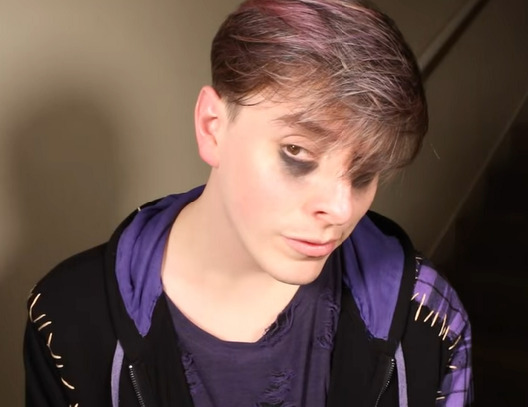
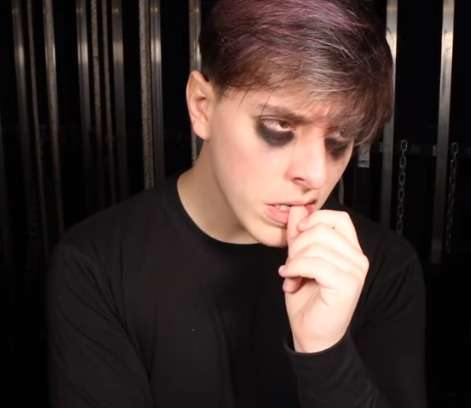
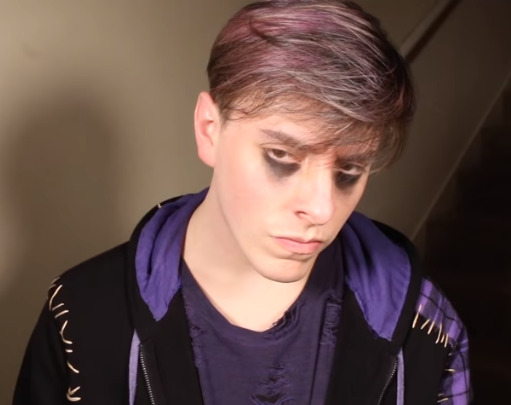
First there’s a peak of interest. Next there’s confusion and wariness. Then, lastly, realization and contempt.
Not only this but it is intriguing to take into account the reaction Roman elicits from Virgil when he mentions the existence of ‘the Dark Sides’:
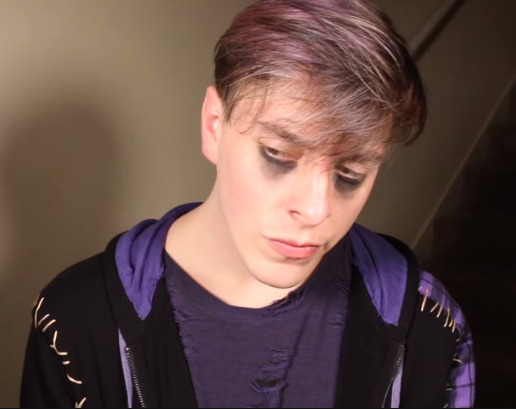
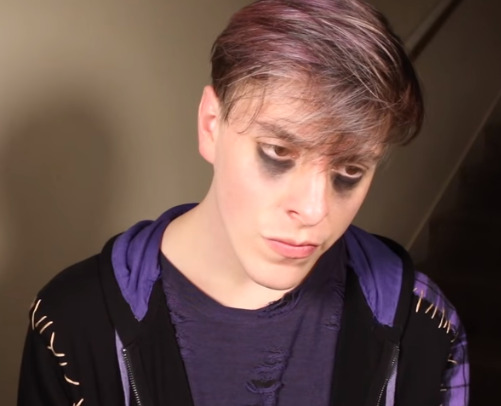
There is most definitely annoyance is his response, but also a sort of sadness and emptiness to it. Roman said himself that he had made up that name on the spot, meaning that the other sides hidden away from Thomas aren’t (or weren’t) commonly called that. Virgil’s reaction could very well be a hurt reminder of who he once was or what he used to be a part of. Remember, Roman has given him similar nicknames before, such as “Dark and stormy night,” and even “Dark, strange son” by Patton, albeit without malice.
These fact and these looks alone were enough to act as a starting point for theories, but the trail often ended here. Until the recent past two videos.
In EMBARRASSING PHASES: The Nightmare Instead of Christmas! the entire purpose of the video was the fact that the other main sides had come to terms with who Virgil was now, which is a good thing, but consequently disregarded who he used to be and what he had been through while he was still the series antagonist.
I found this to be really odd as I thought Virgil himself would want to forget about what he had been subjected to as a villain and would want to appear as less harmful to the group. Then the end credit scene came and Deceit made an unexpected appearance, and do you know what the first thing he said was?
“Very well done Virgil. You’re so evolved.”
This line by itself holds a lot of meaning depending on whether or not it’s interpreted as a lie. Deceit could either be mocking Virgil for having not actually changed at all, or admitting that he has in fact grown. However what he says next leans the meaning more towards the former option.
When Virgil questions Deceit’s reason for being there his response is: “Hm, a bunch of talk about Halloween. A season for dressing up and pretending to be someone or something else.”
Note Virgil’s facial reaction to his saying this:
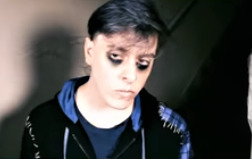
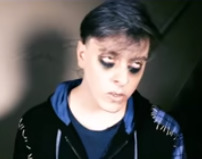
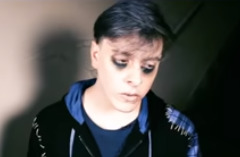
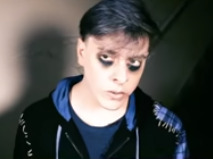
First he roles his eyes in irritation, but then he gives a sadder look off to the side before turning back to Deceit with possibly the softest look he has yet to give him, as if he’s really thinking about his words and taking them to heart.
Adding this in to his earlier statement Deceit's words could then be translated into meaning that he sees Virgil’s evolution was nothing more than a season of dress up and pretending; and as all seasons do, that it will end and he will eventually return to how he used to be.
What truly stuck out in this out of the blue appearance, and confused a lot of people, were the words, “just be sure to.. keep up that personal growth, Virgil. Who knows? Maybe soon... you could be rid of us all...”
Again, the meaning behind these lines depends on where the lie is held, or if there is one at all. Looking at it straight forwardly Deceit is telling Virgil that if he continues to distance himself from who he once was he’ll lose them (whether [them] is the dark sides or the main three is hard to tell.) But if you add emphasis on the “rid” and the “us all” then the meaning is rewritten into Virgil’s attempt to change being the trigger that will cause him to recede back to what he was.
This all could be just wild ideas being thrown, but if you reverse the video and put the end credit scene at the beginning then what you have is not Deceit reacting to Virgil’s development, but rather Virgil’s retaliation to Deceit saying that he hasn’t, or rather can’t, change. The video then makes so much more sense. Instead of Virgil randomly trying to scare the others to show that his past hasn’t been erased, we have Virgil proving that his dark past won’t erase his progress and future with the others.
The fact that Deceit would say that Virgil is “evolved” implies that he knew what he used to be like, meaning that the two of them had interacted closely in the past. But is a simple statement or a few looks enough to confirm their history, or at least the depth of it? Well that’s why I’m going to be analyzing not only their interactions with each other, but also their similarities.
First off, the mother load of Virgil v. Deceit content, Selfishness v. Selflessness. In this video I noticed that Virgil was 1000% more hostile towards Deceit than in any of their other shared interactions. Back in LYING and EMBARRASSING PHASES Virgil still held a cold attitude towards Deceit, but there was defiantly a more mellow (but still tense) atmosphere as they talked. In S v. S Virgil was ruder and more abrupt, even interrupting him the second he was revealed and spending most all of his screen time trying to convince the others to get rid of him, such as when he yelled “Why is he still here?” He literally looked as if he was second away from throwing hands.
Skipping forward a bit, one of the stronger bits of their interactions in this video is when Virgil tried to defend Patton when he tried to bribe Logan with a Butterfinger, saying that the whole set up was already rigged since Deceit, a liar, set it up. Which lead to this interesting part.
“Takes a liar to know a liar.” said Deceit, glancing from Virgil to Thomas. Virgil then looks around with heated suspicion, not yet understanding what he’s implying.
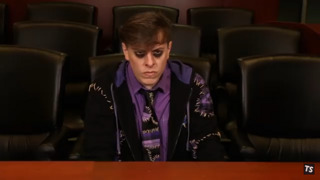
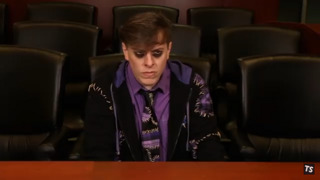
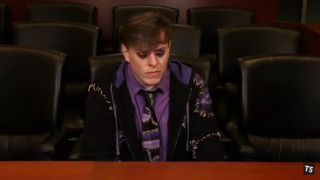
He’s thinking, pondering. He looks around in confusion before it hits him, that Deceit could expose his secrets at any time. He always knew he was a threat, but here it really hits home.
As it goes on and Patton consistently fails to put up a good fight against Deceit, Virgil realizes that he’s losing, Deceit might get what he wants, and his anxiety goes up.
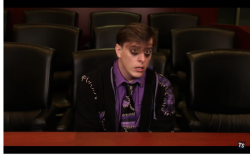
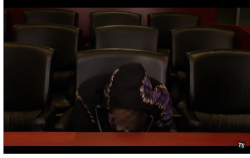
He looks on in horror, shock, and disbelief, and recluses in on himself.
After that Virgil is called to the stand to be the next witness, to which he makes a face at Deceit refusing to go, not wanting to be used as apart of his scheme. Deceit in turn says, “Very well, you don’t usually have anything helpful to add anyway.”
Sound familiar? It should, as it’s what Logan, Roman, and Thomas had told him on multiple occasions back before his redemption arc. Deceit played perfectly on one of Virgil’s insecurities of being useless to Thomas and manipulated him to play the game he didn’t want to be a part of. Then during his interrogation Virgil says something rather interesting:
“He’s a liar. You literally know him as Deceit.”
This stands out for several reasons. Why didn’t Virgil say “we know him”? Does the fact that he didn’t include himself mean that he know something the others don’t? Also, when he says “as Deceit” is he hinting that another name exists? Later in the video when Patton interrogates Deceit he asks if that is his real name, and Deceit answers “It is.” That could be a lie, or it could be true.
After Virgil says this, Deceit then stops him by saying, “Glass houses, Virgil. You you’re self said you’re not a beacon of truth.”
The ‘glass houses’ part is what tripped me. Coming from the saying “people who live in glass houses shouldn't throw stones.” this means that you should not criticize other people for bad qualities in their character that you have yourself. Touching back on when Deceit said “It takes a liar to know a liar.” This is followed up on with a layered, almost vague, back and forth conversation between the two of them.
Deceit: So you’ve never been reluctant to share anything with the group then?
Virgil: Don’t.
Deceit: What? I just meant your name!
Virgil: Don’t!
Deceit: Maybe that’s why it’s so easy for you to recognize me for what I am. Like I said before, it takes a liar to know a liar.
This conversation is further analyzed in my other theory [Virgil Isn’t What He Seems] and for the sake of time, I won’t repeat everything glossed over in there, but I will bring something back up.
As I see it, the purpose of Deceit saying these things and aggravating Virgil is because he knows who Virgil truly is inside and wants him to stop denying who he is, just as he did in the end credit scene of EMBARRASSING PHASES when he spoke of him dressing up and pretending to be something he’s not. Virgil can recognize what Deceit for what he is because they are both pretending.
A hop, skip, and a boat later, after Deceit loses and leaves, Virgil tells Thomas “Do not allow him [Deceit] or any of his... friends to stick around that long ever again. Ever again!” When he speaks of his friends, he hesitates and pauses for a moment, as if he’s trying to find a correct term to describe the other dark sides.
Out of everyone in the video Virgil was the only one strongly against Deceit’s presence. Sure Patton didn’t want him there because he was trying to get Thomas to act dishonestly, but Virgil didn’t want him there under any circumstances. As Deceit pointed out, Virgil didn’t want to go to the wedding either, but he was willing to put his feelings aside just to get rid of him. The fact that no one else was worried about his being there shows that the dark sides and the light don’t really interact with each other that often in the mind palace, except Virgil; maybe not presently but definitely in the past.
Moving away from specifics of interactions I found that Virgil and Deceit held several similarities to each other, and a few other important notes:
They both want to protect Thomas from what they represent, but cannot help who they are.
Deceit didn’t want Thomas to fall victim to a society based on a lie, even though he’s literally the embodiment of deceit. While Virgil wants to protect Thomas from feeling anxious and feeling panicked, yet in the video he admitted that he told Thomas that a drink would poison him after sitting alone for 10 seconds.
Deceit makes an interesting foil to Virgil
Back when he was still Anxiety some fanders had issues with him due to their own anxiety, but it was never that extreme. On the other hand, while it’s perfectly alright and understandable, a lot of fanders have issues with Deceit on a much larger scale then there ever was for Virgil. Highlighting what could have been if Virgil wasn’t so lovable and stayed a villain.
both hiss (silly but true)
Both have inhumane characteristics
Deceit’s scales and snake eye and Virgil’s deep, demonic voice that he gets when he’s overly anxious.
Unique powers: Deceit’s ability to silence the other sides. Virgil’s ability to summon darkness around him.
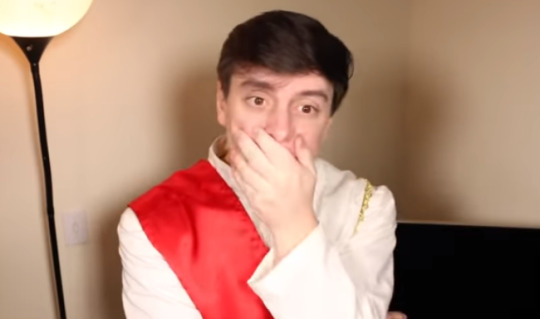
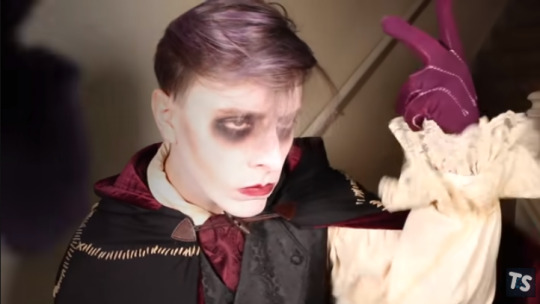
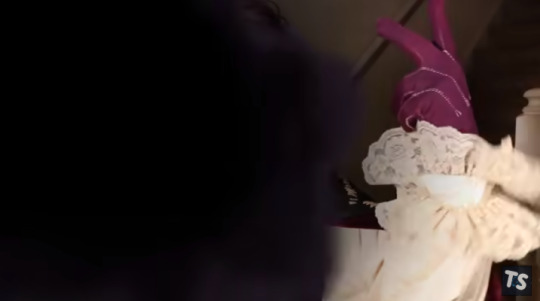
Notice that these two powers of their’s creates 2/3 of the well known proverb of the Three Wise Monkeys, “see no evil, hear no evil, speak no evil” which, in some scripts, lead to the fourth “do no evil.” Deceit can mute the sides and Virgil can blind them. Which just so happened to be foreshadowed back in MOVING ON Part 2/2
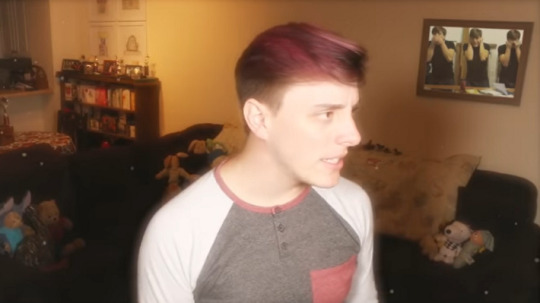
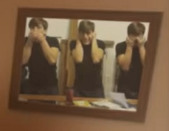
It’s possible that the other dark sides complete this proverb.
Virgil may possibly have naturally heterochromia eyes, just like Deceit, but has hidden them away.
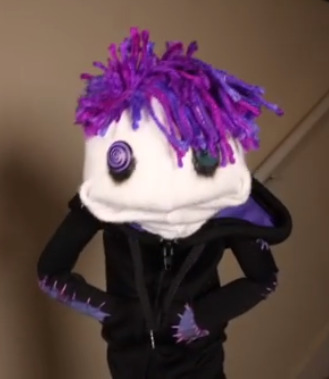
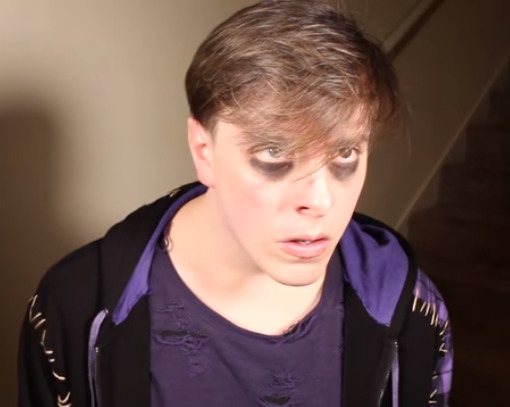
This moment at 38:24 of S v. S has been speculated as Virgil having two differently colored eyes, or it just being an optical illusion due to the light shinning on his hair. But after looking over the video I found that it never happened other than then, which if it had been due to the lighting it would have happened at least twice.
Also, notice that both Deceit and Virgil were the only ones to not go under oath, as if both of them have something to hide
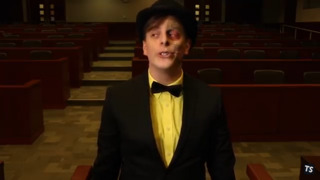
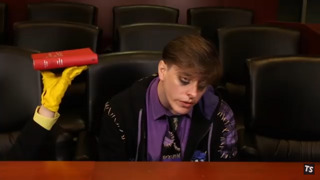
What exactly he may be hiding was brought to my attention by @my-analogical-romance
All the sides have multiple functions except for Virgil Unless he’s hiding them from the others because those functions may appear malicious or harmful to Thomas because of his core purpose as Anxiety. Anxiety in itself manifests and changes as people grow up and come out more as individuals (which as said in MOVING ON Part 1/2 was while Thomas was a teenager.) Anxiety could just be an umbrella for all that he represents, such as Logic and Creativity are just blanket names for what Logan and Roman contribute and manage in Thomas; or because there’s something he wants to keep hidden, something that could link him to Deceit and the Dark Sides.
There is a very high probability that Virgil was once a dark side and rather close to Deceit and the others before he decided to make a change and go to the Light sides. He could have been an accomplice to whatever it is that they did or do. When he was Anxiety he wasn’t truly welcomed by Thomas or the sides. He wasn’t seen as helpful and appeared as just an evil bad thought that had his heart set on ruining Thomas’s life, even though they now know that’s not true. Based on the analysis, in my opinion, Deceit, and possibly the other dark sides, want Virgil back to how he was, or how he seemed, which may tip the scale in the balance of power in Thomas’s head because they believe, as Deceit made claim to, the way the light sides are running things are putting Thomas at risk.
#does this make any sense#sanders sides#sanders sides theory#ts theory#ts deceit#ts virgil#virgil sanders#deceit sanders#logan sanders#patton sanders#roman sanders#thomas sanders#dark sides#light sides#ts spoilers#thomassanders#my theory#long post
2K notes
·
View notes
Text
I feel Merlin could have been so vastly improved by Merlin's magic being revealed. Or, well I say revealed but I mean more by his choice (albeit perhaps an almost forced one because that's probably what would work better plot-wise) than him straight up being outed. Because then, as consequence I would like to imagine he has to leave Camelot. And just think about the potential that leaves for development for so many characters and relationships.
So I'd peg this as something like Merlin's magic is revealed at the end of a season (pre-Uther death) thus leading to him leaving Camelot and staying away for the better part of the next season.
Because first of all with Merlin in that next season there are so many avenues of plot to go down:
a) him interacting with other magical beings - learning to use his magic more, learning about them and learning more about his duty to them as Emrys
b) interactions with some of the not-yet-knights-knights because I'll always want more Merlin and Lancelot/Merlin and Gwaine content PLUS there could also be room for all 3 to have to work together on something and just that'd be fun AND ALSO Gwaine knowing about Merlin's magic would be beautiful chaos
c) interaction with Mordred which could fall into the two previous points but gets a special point BECAUSE how could would it be to have Merlin and Mordred become close and have a good relationship prior to Merlin finding out the whole Arthur's bane thing - it could really further put his following of prophetic advice into question this leading to him perhaps trying to reach out better to Morgana as he realises Kilgarrah and Gauis gave shit advice with the whole kill her/don't tell her stuff
d) also have him travel, like maybe even visit a kingdom where magic is legal to really show the contrast between where Camelot is and what the goal is - make it clear a lot of change is required (plus then potential later plot point of Camelot allying with this kingdom or at least Arthur visiting it)
And then back in Camelot there's the flip side of the coin where you have storyline's surrounding Arthur:
a) obviously the internal struggle of what Uther taught him and what he's seen with regards to magic thus leading to perhaps a growth of his own self-formed and self-educated opinions that lead to him standing up for himself more (as he did to Uther's ghost in 5x03 in a way)
b) realisation of what Merlin did and was capable of - have him struggle and grow proving himself properly on quests of his own
c) development of his relationships - so many of his friendships where Gwen and Merlin made a friend first so let's see Arthur spending time with Knights (like Leon) more and also more development of his friendship/relationship with Gwen
Also also, in Camelot just develop so many other characters because some got kinda less looked into, particularly on later seasons:
a) Morgana - give more screen time to her struggles and have her turn to violence against Uther be more sympathetic to the viewer because she wasn't just randomly evil - it was a valid reaction and framing her story more sympathetically drives home the Uther is the true villain point which should have been a thing
b) Gwen - she was so cool and capable and then she got the throne and that all kind of got chucked away so like first of all, I want her being badass and proving her fighting worth because she can. Also Gwen can be sympathetic to Merlin and Magic - this is doubly interesting because on the one hand this could lead to Morgana confiding in her and having a truly good person in her corner (because Morgause, whilst not necessarily wrong in her actions and motivations, was mayhaps a tad manipulative) whilst on the other hand she could pushing Arthur to do the right thing. Also on the subject of Arthur, if Gwen and he are developing their romantic relationship - perhaps have a better focus on the reality of if she becomes Queen, make them face the differences they have in lives and the changes she'll be expected to go through to become nobility. Have her learn cool Queenly things like diplomacy or smthn idk I'm probably in a minority here who's like whoo fictional diplomacy.
c) Elyan - this is perhaps more random but I just think it'd be neat if he came back to Camelot earlier because then there's the sibling relationship with Gwen and, assuming the canon Knight crew still happens, friendship with Arthur.
d) Uther - develop 👏 that 👏 evil 👏 bastard 👏. I want full showing of the scale of his atrocities, I want accountability for his actions, I want insight into what magic really used to be like in Camelot (so like low-key ig I'm advocating for flashbacks but not ones that make him sympathetic - he's a dick and that should be made clear), and so on. And also, further develop what he's like as a father - neglectful, cruel, kind, caring? Show me the contrast of his treatment of Arthur to everyone else.
d) Nobles - I want this in that way that like Mithian should have got more development and in the way that having a true understanding of the noble view of magic would be useful - do they actually hate it or are they just following Uther because they value their position over innocent lives lost? Either way it's a dick move on their parts but it makes clear the position should Arthur change the laws as king.
e) Everyone Else In Camelot - so ig this is mainly peasants but there's like varying levels of peasant if I remember my GCSE History correctly. Anyway, similar to nobility, I wanna know the real thoughts on magic? I wanna see how ingrained the hate and fear is. I wanna see the peasants who are cool with it/who use it. Basically show both the main characters and the viewer what this kingdom Arthur is set to inherit is really like.
#This was written on my notes the other day so like if it's formatted weird I'm sorry#merlin bbc#morgana#arthur pendragon#sir elyan#sir leon#lancelot#gwaine#uther pendragon#also sorry I didn't mention percival in this#He deserves better#queuing in the void
17 notes
·
View notes
Text
QfG Rants and Remakes part 5
Big thanks to both @agathasarmy and @yarasquad for sharing their ideas with me and believing that I could actually make a coherent rant without being too swallowed up by my emotions and hopefully I'll be able to do the same here.
P.S. Imma change the title of the next Rants and Remakes cause it's definitely not focusing on QfG anymore and it's gonna focus of AWWP so yeah...there's that to look forward too.
Chaddick & Yara + Tagatha interlude
Note: This post was originally gonna be titled "Chaddick & Yara + Mourning the Departed" and would have turned out as how it is explained below but as I was writing about Chaddick I realized that I needed to talk about something concerning Tagatha and realized that this post would have been too long for all three so I gonna move the "Mourning of Departed" in its own post. Hope you guys understand. Tagatha has a strong pull with me.
Imma actually gonna outline this cause I need to organize my thoughts and at least with this I could remember the direction that I would be heading.
First part's definitely going to talk about how Chaddick and Yara's death is bs
Then imma explain why them staying alive would have impacted the TCY storyline a lot more meaningfully (p.s. this is where the Tagatha interlude will be found)
And last (and this has been moved to its own post so stay tuned for it), I would also like to nitpick Soman's obvious lack of thought when it comes to the characters that have departed (mainly Callis and Lady Lesso and August Sader) and how it should have affected the characters (mainly Sophie and Agatha)
How Chaddick and Yara could have helped the storyline better
WARNING: I realized while writing this that I kinda made Chaddick and Yara more flawed than they are writen because I have to think about their character growth and they can't have that without having any flaws. So expect some more drama with these two than needed as I share my thoughts on how their characters could have went. They get better in the end believe me.
So I think that everyone in the fandom is one with the idea that Chaddick's death was one of the MOST worst decisions that Soman made.
As @agathasarmy said it once, Chaddick's death is more frustrating than sad because of how out of nowhere it is.
Via @agathasarmy:
but… Chaddick??? dying??? IN THE BEGINNING OF THE SERIES????
IT DOESNT MAKE SENSE, AND THE ONLY WAY IT MAKE SENSE IS COS SOMAN OBVIOUSLY DID IT TO INTRODUCE RHIAN AND THATS THE SHITTIEST THING ABOUT IT
HE REDUCED CHADDICK’S DEATH AS A PLOT DOOR WITHOUT PROPERLY SUBSTANTIATING CHADDICK’S CHARACTER FIRST SO INSTEAD OF US TRULY MOURNING HIS LIFE WE’RE JUST LEFT WITH THIS HOLLOW FEELING OF WHAT HE COULD’VE BEEN AS AN INTEGRAL CHARACTER TO THE PLOT
THIS
Chaddick's death felt hollow because it was a PLOT DEVICE. It didn't (or at least Soman didn't) conscider Chaddick much of a character but a means and once this happens some deaths can be very very hollow.
Like his POV chapter was very hard to read all because especially once you find out that he's dead by the end of it (SHAME SOMAN, SHAME) because his story and plot had so much potential. We weren't able to properly feel sad about his lost because we didn't get to know him better.
It just feels tragic. So much potential lost, all because Soman wanted Tedros to feel vulnerable because he lost his close friend.
WHICH SOMAN DIDN'T REALLY NEED TO DO
I explained already why this is bull and I'm gonna explain later what could have happened for Chaddick's character.
But in summary on why Soman didn't need to do it: EXPECTATIONS
Chaddick and Tedros would have been stressed out with all the expectations and comparison with Arthur and Lancelot. One wrong move could have broke them apart easily.
But Soman could have also not wanted to deal with Chaddick against his Sophie obssession so there could be that too.
SHAME SOMAN
Now, Yara.
Our little Soft Girl
She should not have died.
She really shouldn't have
W h y ?
Because her being alive would have impacted the story more than her death ever did. Just like Chaddick.
And if the problem was what she could have affected in the storyline in TLEA, then she could have been on the sides like. . . as Tristan from time to time or something.
Her being alive would have not affected or change TLEA at all. Like if more important characters like the Coven and the League can fade into the background then so could she.
But I really don't imagine her being in the school for New Evil with Aric as Dean. No, maybe Yuba could have hidden her with the League and she could have accompanied Princess Uma when they were getting Tedros and Agatha and then accompanied the Leuge or something.
Really it would have been that simple. C'mon.
Plus Kiko has been reduced to wreck after that. At least, with Yara being alive she could have fixed herself a bit more.
Okay
So in summary again: CHADDICK AND YARA SHOULD NOT HAVE DIED AND SHAME ON SOMAN FOR KILLING THEM OFF
Now, let's get to the juicier part, what could these two have contributed to the TCY storyline.
On Chaddick
It's pretty obvious what Chaddick's role should have been. He should have been important to the plot because his role would have been about breaking the comparison between the Past and the Present (see Soman, it could have been integrated into your canon plot) between him, Tedros, and Agatha to Lancelot, Arthur, and Gwen.
I'm pretty sure that Camelot has its eyes on these three.
It's pretty freaking convenient that they all have a predecessor to be compared to. And I'm pretty sure that it's not just Camelot who notices the pattern. I mean the whole freaking Woods read about this affair.
So Chaddick, along with Tedros and Agatha, should have been the ones that break this chain. It could have symbolized that Camelot was entering into a new, better era after a similar relationship broke it.
Like, a King, his beloved Queen and his most trusted Knight brought hope but ended in a Tragedy.
Now, another King, his beloved Queen and his most trusted Knight are skeptically judged for having the same pattern and they instead bring the Glory that first trio didn't
With Tedros, Agatha, and Chaddick united with each other bringing Camelot out of its traumatic experience with Tedros's parents, Camelot finally accepting that these three are not the same as Arthur, Gwen, and Lance and fully supporting them DESPITE the fear, would have been a much stronger message of that 'the past doesn't always repeat itself.'
Because with Rhian being known and most propably remembered as Tedros's most trusted Knight and betraying him in the end, it's like a copy of what Lance technically did to Arthur.
It just further proved that Camelot's King would always be betrayed by the ones they trust most.
Sadly for Arthur, he was betrayed by both Gwen and Lance and they left him alone.
While Tedros still has Agatha but without Chaddick the lesson simply is not learned.
Chaddick was integral to this formula because Camelot would have had to face yet another propable tragedy for their beloved King in the hands of the people he loves. With Tedros, Agatha, and Chaddick, complete, proving that they could do better despite having just a strong a bond as what Arthur and co had and Camelot accepting and trsuting this, the previous wounds would be replaced with new Hope.
Because even if that whole affair happened and ruined the Kingdom, at least they have proof that it's not always gonna happen that way.
And that's why Rhian being remembered as Tedros's Knight hurts this idea. Cause he betrayed him too.
Anyway, hopefully I made my point with this legacy thing.
Plus Chaddick and Arthur's Round Table training him. WHY SOMAN WHY?!?!?!
And now, imma explain what I think should have happened with Chaddick and how his character development and his role should have played out.
Because Chaddick is a pretty well rounded character, his POV chapter proves that he's brave, and is willing to die for his friends and what's right, and there isn't really much flaws to him aside from that he can sometimes make the most worst decisions despite being pretty wise.
I honestly cannot tell if he is stupid sometimes or Soman just does this to him cause PLOT.
Fandom I need help with this. Give me some opinions.
Like. . . he's wise enough to know what was right, examples being warning Tedros about Sophie and the first to listen to Agatha in AWWP, but also dumb or ignorant enough to bully Agatha in Book 1 and that VERY IMPORTANT THING ABOUT completely ABUSING Tedros is AWWP.
Like I'm kinda confused with him.
Well maybe we can say that he's a bit ignorant and maybe was raised with privilege so that's why he bullied Agatha in Book 1 and kinda wisened up in Book 2 about her.
But I am not excusing his attitude towards Tedros in AWWP because that was messed up. Well, AWWP was messed up so there is that but if we have to acknowledge that mess and have some closure then I vote for it to come from Chaddick and Yara.
Like maybe the reason why Chaddick is more wise now is because of that very experience. Maybe he could still be a bit guilty about it and that kinda messes with his mind cause he still thinks that Tedros is still the same boy those years ago in their second year and Rhian uses this to his advantage.
Actually, thinking about it this makes so much sense.
Like instead of AGATHA having the trust issues (thought I wouldn't completely vanish it, just not at the same level as she does in canon) it's CHADDICK that has them. Cause he's always kinda gets haunted by what happened in AWWP.
I mean Tedros replaced him with ARIC of all people when he failed to retrieve Agatha. There has to be some animosity between them since. I can imagine that Chaddick kinda felt like him and Tedros could never be as close as when they were during their first year. And he would totally understand it if Tedros never really forgave him for what happened and was at peace with it even if he didn't have enough guts to find a closure for it. He'd respect his friend first and foremost.
But then comes Tedros, all fine and inviting him to be his Knight like that would mess Chaddick up.
He propably couldn't believe it at first and maybe even kindly refused the offer at first but then he sees the heart break in Tedros's face and Chaddick realizes that Tedros really wanted this.
Tedros still sees Chaddick as his closest friend despite what happened in AWWP. And maybe after some thinking, Chaddick realizes that he still wants to have the bond with Tedros like what they had in Book 1. So he accepts.
But of course, they've changed and Chaddick still gets eaten by guilt because I think that he's the kind of person that knows that he did something wrong and wants to repent for it.
So instead of that wise friend that Tedros had in Book 1, Chaddick can't trust his judgement about Tedros because he's scared he'd go too far. So he kinda just agrees to Tedros's ideas and doesn't really give advice. Tedros kinda notices this and tries to talk to Chaddick about it but Chaddick would be all formal to him. Tedros, I don't really know, would think that it would be for his sake with the comparison with Arthur and Lance and all. So he kinda just goes along with it.
It's messy right now guys, I know, I'm kinda butchering Chaddick's character here but I promise it gets better and in my mind he'd be like this for only Book 4. He'd be Wise Chaddick again right after. Just give me a chance to explain.
So they have this kind of miscommunication thing that Canon Tagatha had in QfG instead and that would have made so much more sense and here's why;
Warning: this is officially where the Tagatha interlude starts so if you wanna skip it (why though???) find the sign that states it's the end. It's gonna be in pink too.
The fact that Tagatha was having a miscommunication failure was kinda off with me because 1) they've been over this in AWWP and TLEA. In TLEA Tedros has absolutely no problem with pushing Agatha to share more when she wouldn't and 2) he could easily read her like a book, especially when it counts. Like he could get her favorite food wrong but he always seemed to know what Agatha was having trouble with and was there to help her out and is not afraid to call her out on it (i.e. the Cinderella thing, he was on point there)
Imma provide some examples of Tedros totally getting Agatha when it counts;
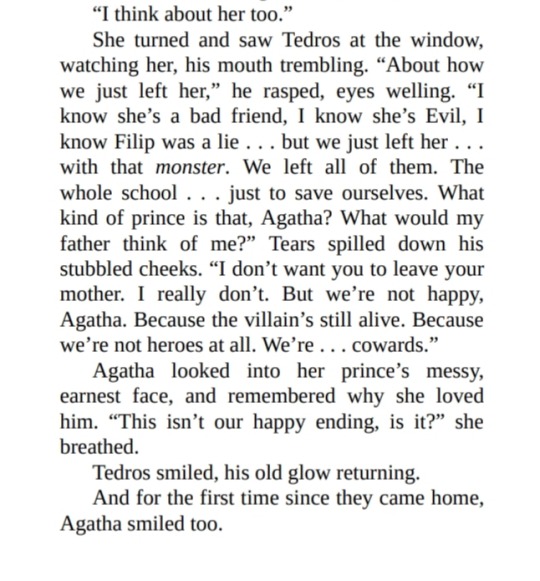
AND THIS

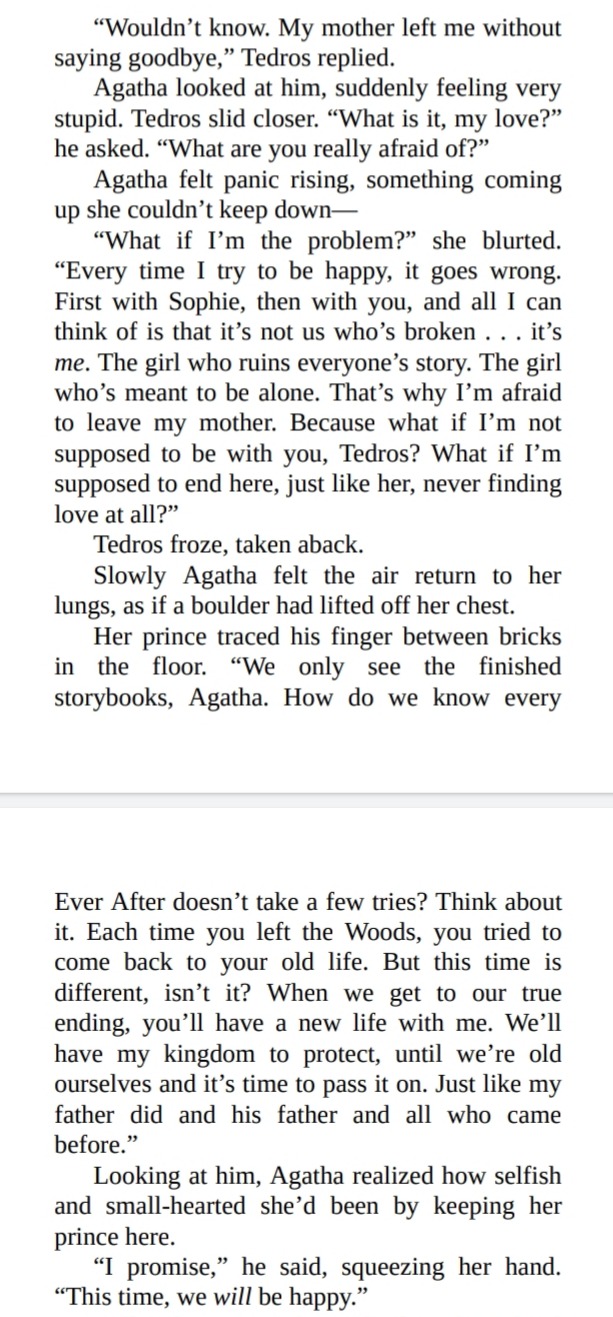
AND THIS TOO
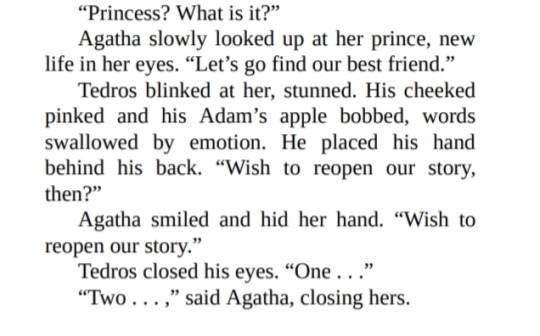
WAIT THERE IS MORE (The Tagatha Moment)
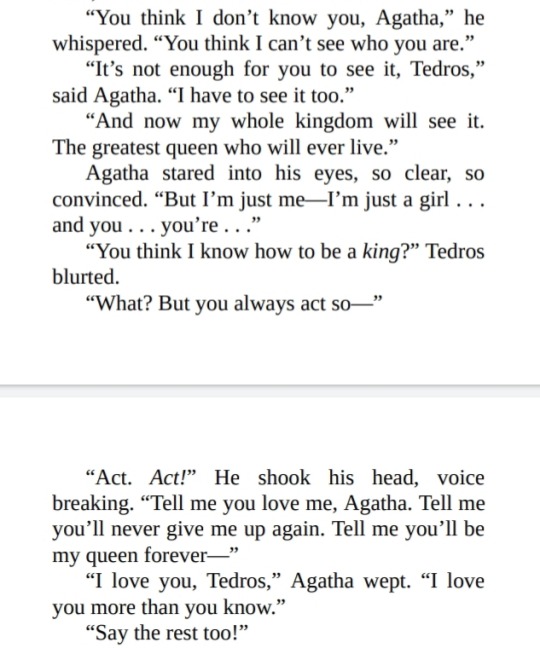
AND LET US NOT FORGET
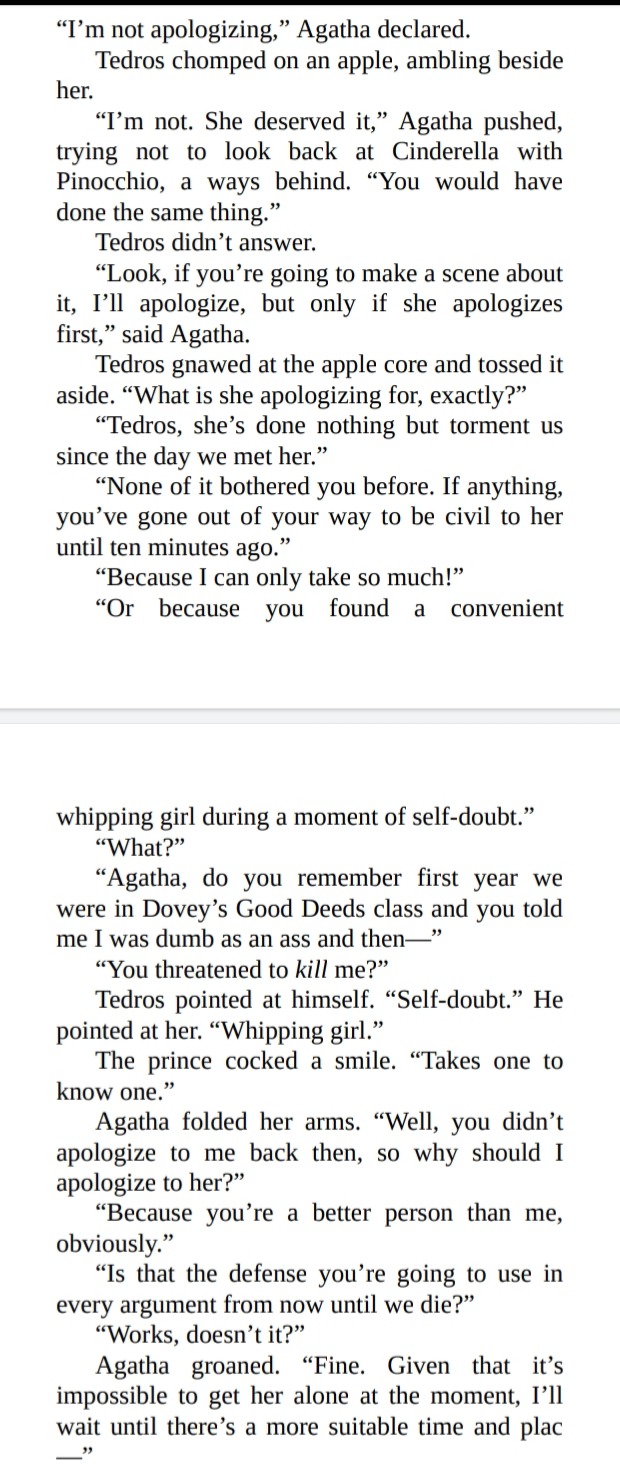
THIS IS WHY TLEA TAGATHA WILL ALWAYS BE BEST TAGATHA.
I get that Agatha's insecure about herself and maybe she was kinda influenced with the Excalibur thing (but I highly doubt it though) but it's no reason for her to get to the conclusion she did at the end of QfG.
I mean girl, you were always thinking that Tedros would be a Great King in TLEA and that's why you've been so insecure about yourself. WHAT HAPPENED TO THAT???
Someone call me out on this PLEASE. I'm hurting myself by judging her too hard.
I can imagine that she would be sceptical with Tedros's ideas and kinda doubting him about it (you guys have no idea how much it hurts typing this) but I can also imagine that she would never doubt that Tedros's heart is in the right place even if she thinks that the way he gets there isn't always the best.
Like we have literal proof that Tedros gets Agatha almost like Sophie does and the best thing is that I'm sure that Tedros would think of the best in mind.
The mess in QfG makes no sense because they should be over this miscommunication bs and it should not have been a thing.
And if it was because of the stress with Excalibur and his responsibilities as King that made Tedros suddenly not get Agatha then WTF Soman!?!?!? I did not ask for this. They were literally about to die in TLEA and yet they could still joke and tease each other and have these cute little scenes with the other.
Instead I got Rhian's b*tch ass being Tedros's therapists when he knows sh*t about this boy and Agatha doubting Tedros like he did something horrible. (Well he did for trusting Rhian but i digress)
I could have had more of these cute Tagatha scenes instead. Like, is it too much to ask for these two to just show their love for each other in other ways than "I will save you" and "You're the best thing ever and I don't want to lose you for this horrible thing that I did or say" like give me small softer moments anytime.
Tedros gently teasing Agatha when she's being difficult and Agatha being totally trying not to show that she's smitten over it.
Agatha trying to be romantic at the most outrageous moments and Tedros being like "?????" but totally finding it cute.
Other character just not getting these two when they do and they are just as confused.
These are the kind of scenes I wanted from them. And if I have to use Chaddick to get it then so be it. (I'm sorry about this, I'm mostly projecting at this point and these really affecting my personal opinions on this matter but I'll try to tone it down a bit so that it's still coherent)
Note: this is the official end of the Tagatha interlude but i'm not keeping any promises that it'll be the last
Anyways, Chaddick and Tedros, they have more reasons with having communication problems because;
They have not been together for a very long time and they've both propably changed since
AWWP. So far, the two of them have had horrible experiences as the last thing that they remember about each other.
As I explained, I headcanon that Chaddick has a somewhat formed a sort of PSTD with it and is very scared that he's gonna mess it up.
I'm not even going to try to explain the PSTD thing cause I feel like I'm not gonna do it justice but I hope you get what I mean.
Chaddick must have become more unsure of himself after AWWP and he must still be trying to fit this new Tedros with the old one that he used to hang out with in Book 1. It would have been a good comparison to show that Tedros has indeed change and grown since then.
Like Chaddick kinda feels like he needs to intervene when Tedros shares a very outrageous suggestion but doesn't know how and kinda ends up in a mess.
Basically imagine Tagatha's problems in QfG and apply to Tedros and Chaddick instead.
And Chaddick would have been suspiscious about Rhian from the beginning. He's a smart savy guy afterall.
So Rhian kinda exploits this and gets the two boys against each other. Because say that Tedros and Chaddick have this big fight propably like the one when Agatha comments that Tedros was being a horrible king but Chaddick's the one that said it instead. Say that this happens around the middle of the Book and it's the final straw between them because they haven't been properly communicating and all the pressure on them. Rhian could easily worm his way to Tedros's side and replace Chaddick nicely. Cause unlile Chaddick, Rhian would make Tedros believe that HE'S the one that believes in him the most.
So they kinda fall apart and Chaddick and Tedros are trying to understand where it all went wrong.
Agatha would try to understand each side and get them to better terms again but she can't do it alone plus a-hole Rhian is butting in.
I imagine that, for me, the logical person that Chaddick might approach on his dilema with Tedros might be Ravan.
Cause the two of them basically think the same way and are usually calm and wise. The only difference would be that Chaddick's more active while Ravan's more passive and choses to observe before making a move. So he calms Chaddick down when he's being too impatient.
Chaddick and Agatha would be talking of course. And I don't know why but I imagine that they're more numb to all the gossip about the three of them especially around each other because they're both sort of level headed and wise then when they're with Tedros individually.
And I imagine this is where the Tagatha drama happens. Only after Rhian cause I wanna be clear that without him, Tagatha would have been fine. He also tries to break them up by saying that Agatha sides with Chaddick and that she doesn't have much faith in Tedros too.
Agatha's going to deny this of course (because it's all bs from Rhian) but Tedros has been too stressed and vulnerable that he sorta starts to believe it and Agatha gets frustrated that Tedros is choosing to believe Rhian when she's known him longer and after everything that they've been through.
But Tedros isn't fully under Rhian's spell. I would have put several times when they would doubt each other especially when Rhian talks crap about Agatha and Chaddick and it would be beserk button for Tedros so Rhian doesn't really go there.
Now Chaddick would be having his little personal battle with himself and Ravan and Agatha would be there to support him and give some advice.
The real kicker would have been when Rhian is adored by Camelot as Tedros's Treasured Knight, someone better than Lancelot and Chaddick kinda has a heartbreaking moment because HE'S supposed to be the one that was known as Tedros's Treasured Knight not this stranger. Not this stranger that stole everything from him especially his best friend.
Agatha hears about this and reflects the time when she gave up her own position as Tedros's queen in TLEA and remembers that Tedros knows her and all her monsters and has been the light to help her fight them.
So she and Chaddick have this talk and she tries to concinve him that Tedros wouldn't want for Chaddick to just give up on him like that. Chaddick thinks about it but is still not completely convinced but Agatha reminds him that Tedros CHOOSE HIM to be his Knight and Liege and they both have to fight for it.
It's Ravan who finally manages to get Chaddick to gear when he asks Chaddick if he's going to regret anything he should choose to either regret letting Tedros go and not fighting for their friendship or make a complete idiot of himself but fight for their friendship instead.
So Chaddick does the latter but everything is too late and the Rhian thing happens as I explained in the first Rants and Remakes post and Chaddick gets tossed into jail with Tedros.
It's in book 5 that I imagine their relationship actually starts to heal itself and they both try to get through everything. I haven't thought of all the kinks out yet but I imagine a lot of fights and Chaddick just kinda shouting what he thinks before he startsvthe regret it and Tedros being this physic and just getting Chaddick too like how he does Agatha.
Again, I haven't thought of everything yet but I'll share it when I do
Now let's move on to Yara
On Yara
Yara would have been more influencial alive then dead and I already explained why how she could have been handled in TLEA cause where I really see exploiting her is in the storyline of TCY.
With the Balance vs Chaos in mind as well as the Lady of the Lake villainess plotline, Yara could have been the answer to this.
She'd be a living reminder of everything that all the characters went through in AWWP and how horribly toxic it is to everyone. Especially those like Yara who lives in the between.
Like with the Lady plotline she would have promoted ultimate purity for both Good and Evil and doesn't believe that each side could be able to understand each other so she thinks that she's promoting Balance that way and that letting each side corrupt the other is Chaos.
She would have believed that Yara is an abomination to the Balance because she is the embodiment of the idea that you can choose some charcteristic from two sides and still be yourself.
Plus with Yara alive the other characters would be forced to rethink their ideals and how to approach this new possibility and reflect on the old ways that have been hurting the ones that are similar to her.
I imagine that Yara's gonna have an internal struggle with this like she's still trying to understand it herself and as she tries to understand it the more that the other characters do as well.
I haven't actually thought out her actual detailed storyline just yet and even though I wanna say more I know that I might butcher her character as I go on but I definitely know her importance to the possible story.
As I explained before, if in TSY was Good VS Evil and that the TCY was about Good AND Evil and how both sides need each other to grow and develop and that the importance of the School still teaching Good and Evil in its most purest form is so that they'd all have a guideline to go by but the curriculum has become more flexible with their beliefs OF Good and Evil and that every student just have shades of grey but choses to go by these either of the two and can still be a Hero or a Villain then Yara could have been the right person to show that it doesn't matter if your not completely on one side and was given the characteristics of the other, it matters what values you choose to follow despite it and how tou choose to use it to help everyone else for the better.
Cause it's canon already that it doesn't matter what they are, it's what they do that counts.
NGL I'm not completely satisfied with how I explained Chaddick and Yara I feel like I didn't do them justice here and I will definitely get back to this when I have organized and fleshed out my thoughts on them
Anyways, if you guys would like to add your own thoughts to this post pls do.
#tedros#agatha#sge#sfgae#tsfgae#the school for good and evil#school for good and evil#soman chainani#chaddick of foxwood#chaddick#yara of avalon towers#tristan of avalon towers#tagatha#agatha of woods beyond#agatha of camelot#tedros of camelot#I personally feel like this was messy and not as detailed as the rest#sorry guys but gonna do them justice#once i've fixed my thoughts m
48 notes
·
View notes
Text
Rhetorical Ink Reviews: Yuri on Ice!!!
** SUPERCHARGED SPOILERS BELOW **
One of my friends recommended this show a long time back, but I just now got to it. After watching the sub, then the dub, then the dub AGAIN...yeah...it’s time to review it for you all!
It just so happens that I also get to watching this show as Pride Month begins in June. What a coincidence...anywhoo, without further ado, and ten thoughts are NOT enough, here are:
My Top Twelve Thoughts on Yuri on Ice!!! Season One:
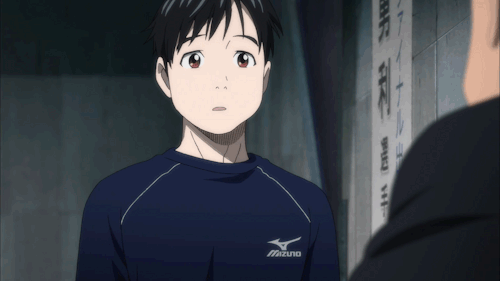
12. I don’t do this a lot for anime, but I actually recommend the Dub. I love the original Japanese, but the dub is just...wonderful.
Plus, the voice actor for Yuri is PERFECT. Can you believe it’s the same voice actor as both Tendo in the Haikyuu!!, Tokoyami in the My Hero Academia dub, AND Tyrion Callows from RWBY?! The RANGE on Joshua Grelle, y’all!
Bonus, the Russian accents for the VA’s of Viktor and Yurio are ADORABLE.
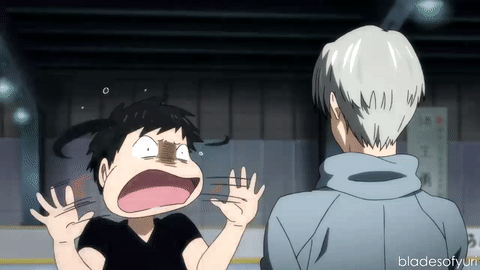
11. The three main leads are just so three-dimensional. I may have never related to a protagonist more than Yuri Katsuki. Yuri starts out the series having made it to the Grand Prix Skating Finals, only to place last. Down-heartened, he slumps into bad eating habits and lacks any motivation; moving back home after being away for five years as a professional figure skater.
We’ll talk more about Viktor and “Yurio” below individually, but Yuri is such a empathetic character and you really root for his development and growth as the show goes on and he grows more and more confident as a skater, and a person.
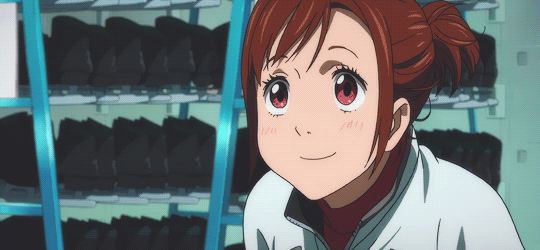
10. Before we dive into our other main protagonists, I want to say that the side characters are fleshed out, too, for what we see of them. Minako, Yuri’s ballet teacher, is a perfect representation of all us fangirls watching the show, and there are the other skaters, which I’ll go into detail about below, too, but I want to focus on Yuri’s childhood friends Takeshi and Yuuko Nishigori in this point.
When we first meet Yuuko, we get the idea that she was Yurio’s best friend as a kid. There’s this Lily and James Potter moment with Takeshi, as he makes fun of Yurio as kids and comes across as a snot-nosed brat. Just as I think in the first episode that Yurio is about to confess his love to Yuuko, we find out that she’s actually married to their other childhood friend, Takeshi. And they have a set of triplet daughters, appropriately named Axel, Lutz, and Loop. Ha.
I do like that later on we actually see Takeshi’s grown up -- he no longer teases Yuri in a mean way; he’s actually a huge supporter of him. I like that we see how these characters have matured and stayed friends. Not to mention the three girls are pretty much a catalyst to the plot of the story.
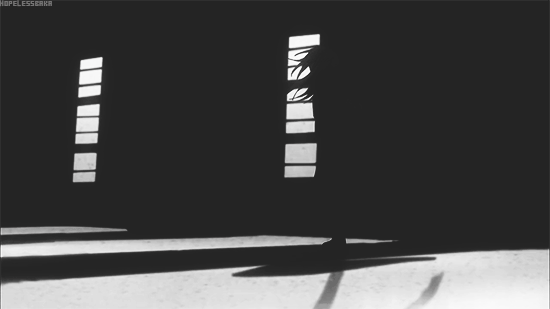
9. Okay -- I absolutely LOVE Yuri’s character and relate to him the most -- but how can you NOT LOVE Viktor Nikiforov?
It would have been easy to make Viktor a pompous, playboy, especially given how successful he’s been as a skater from the start of the story.
But instead, they reveal that Viktor is a sweet, determined, passionate dork who loves his poodle Makkichan and is a fool for figure skating. His constant enthusiasm is infectious and he comes across as a character you just WANT to be friends with.
The more the show goes on, though, we learn how Viktor is so entrenched on the positive side of the emotional spectrum that he doesn’t handle emotional distress well -- now, THAT I can relate to a lot. When Yuri has a meltdown, Viktor struggles to respond in a way that’s not awkward or insensitive. But, deep down, he just wants the best for those around him, as we see with him motivating his fellow competitors to do their best. He’s also worried about his thinning hairline -- poor guy, being around Viktor’s age, I feel his pain.
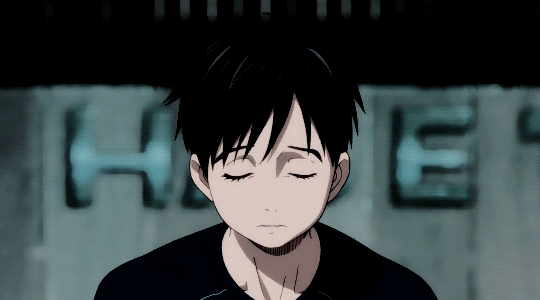
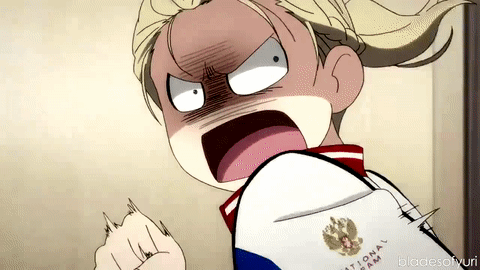
8. Despite coming across as a pretentious punk, Yuri Plisetsky from the first episode, we all agree that “Yurio” as he’s nicknamed is actually a giant Piroshki covered in cinnamon? He comes across as constantly irritated, rough, and displeased. But when he’s around his closest friend and grandfather, he shows a softer side to him. He’s definitely an embodiment of a Russian cat.
I also love that Yurio is impatient to prove his talent, and constantly wants to act more mature than he really is -- WELCOME TO THE MADNESS, ANYONE -- but he is also aware that he’s not going to be that youthful for much longer, and wants to maximize the potential for what he can do in the moment. Should they continue the show into a second season or in the movie, I hope that Yurio growing older is touched on. He makes constant references to Yuri being the age for retirement, and calls Viktor a “geezer” in skating years -- it would be interesting to see Yurio facing the event of aging as a figure skater in the future.
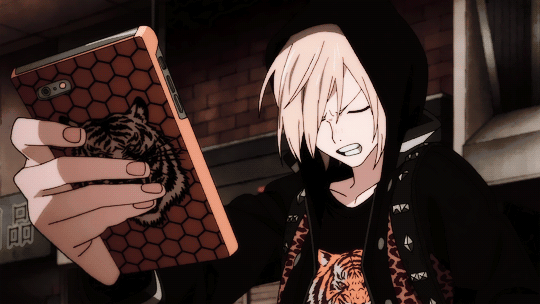
7. We get introduced to the other figure skating competitors, and I have to say that for me, the ones that stand out are Pitchit and Chris, which is funny, since each are friends of our main protagonists Yuri and Viktor. I love that we get their backstories, understand their motivations, and actually see all of their performances.
Phitchit is just a cinnabun, and I love how supportive he is of Yuri in all he does and just radiates positive energy! And then there’s Chris...ohhh, Chris. I have to admit, one of my friends is actually a LOT like Chris -- maybe that’s why I was drawn to him in the show. His flamboyance is comical, but he also clearly has a good heart. The pool scene with him and Viktor is one of my favorites in the show.
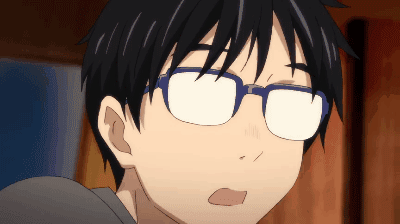
6. Now, now it’s time for the MEAT of the show. And I’m not talking pork cutlet bowls, y’all. I really had no clue going into this show that it was going to have these three things: First, the humor.
This show has so much heart and humor -- I found myself laughing so much during this show, mainly with the interactions of our three main leads, but the animation plus the voice acting just NAILS it for me. Viktor being dorky particularly gets me, but Yuri’s reactions are just as golden!
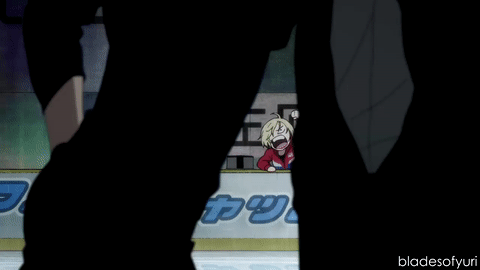
5. Second, and this one is pretty much my jam: The RELATIONSHIPS. Well, specifically, that of Yuri and Viktor. I know I’ve posted this gif in a previous post when I was reacting to Episode 6...but it’s worth re-posting before going further:
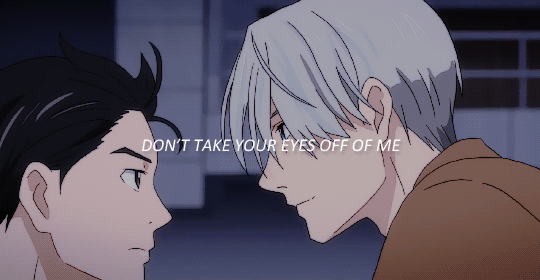
I don’t care what gender is involved, if a show has a well-defined and complex relationship, I am ALL IN. Yuri on Ice!!! does not disappoint in this department.
Yuri starts out as a huge fan of Viktor’s skating, putting him up on a huge pedestal, even naming his dog after him as a kid -- though it’s established Yuri and Viktor are only four years apart in age.
But, once Viktor starts to coach Yuri, the two come to this mutual understanding of one another and develop this intense bond. I love that Yuri realizes that he does look up to Viktor, but he doesn’t necessarily idolize him -- he actually respects him and knows that Viktor “meets him halfway” when he opens up to him. Viktor, likewise, realizes that Yuri not only isn’t weak, but has incredible potential, and is a kind-hearted person who gives his all and can match Viktor himself in terms of competitive passion towards figure skating, and winning.
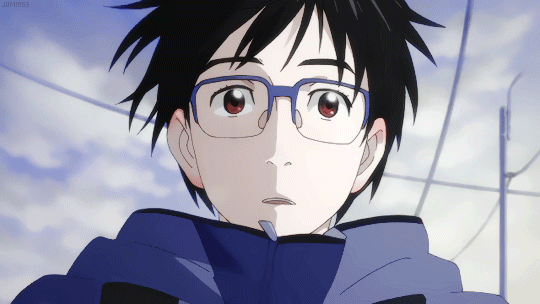
There are so many gifs of these two that I can’t post them all, but these two are probably one of my favorite anime couples, now. This idea that alone, you can only go so far, but together, you can be so much stronger!
Oh, and there’s Yurio -- we get a brief, albeit adorable friendship bloom with him and Otabek Altin from Kazakhstan. Otabek clearly brings out the best in Yurio -- I really hope that we get future development with their relationship, too, since it’s only just started in Episode 10 of 12 in the first season.
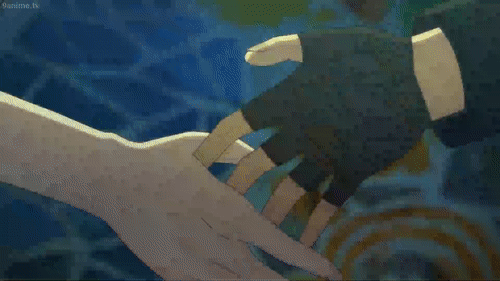
4. Okay, and finally, the STORY and the twists got me in this show! The slow burn of the relationship development between Yuri and Viktor is grand, and you can’t deny the seductive fangirl moment of the forehead touching, or how Viktor is so proud of Yuri that he kisses him in Episode 7, but it’s the plot twists in Episode 10 that just tore the whole show open for me!
In the episode, Yuri decides to show his appreciation for Viktor (plus give Viktor a birthday/Christmas/”good luck” charm) and gets them matching rings. Of COURSE, we the audience can see the parallels to them being wedding rings. Later, at dinner with the other skaters, Viktor corrects the confused fellow competitors, saying they’re actually “engagement” rings and that he will marry Yuri once he receives a gold medal.
*Insert the loudest fangirl scream imaginable*
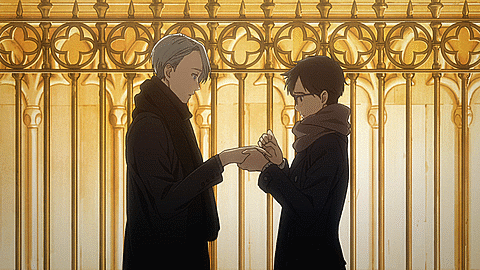
But then, we discover at dinner that Viktor’s first conversation with Yuri wasn’t actually at the Hatsetsu bath house...it was at the banquet after the Grand Prix where Yuri received last. We find out that Yuri, feeling depressed and down-trodden, got drunk and flirted heavily with Viktor, begging him to come be his coach. Viktor, taken with the whole flirting and proposal, and after seeing how much potential Yuri has with imitating Viktor’s moves in the video the triplet’s posted, decides to come coach him. THAT was why Viktor was so flirty at the start of the show -- he thought that was naturally how Yuri was! Everything at the start of the show that seemed so forward and out of place for Viktor’s character suddenly makes SO much sense after we learn this little tid bit.
But also, that ending credit scene for Episode 10. Holy guacamole!
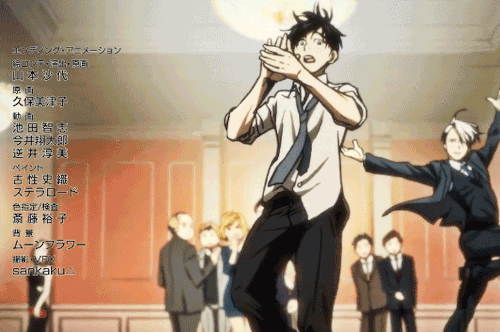
3. And then, there was the final in Episode 12! Honestly, I was actually completely fine with Yuri taking silver and Yurio taking gold in the final, even though they were SO close! Yurio establishes that he wants to keep competing against Yuri -- he doesn’t want Yuri to get complacent and just quit after winning this one time and retire. And I love that. I was happy that Yuri got silver, because that means that Yuri’s at least going to skate one more year -- but NOW, with Viktor AND Yurio competing against him, along with the other competitors! It’s such a great way to hype us up for what we hopefully have with another season or the movie.
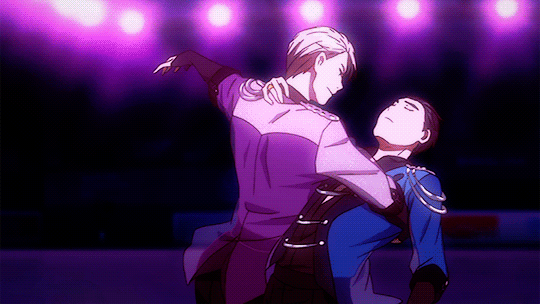
2. Okay, just a thought here. I am SO excited to see not only Yuri and Yurio skate again in the next season to come and/or the movie, hopefully, but also VIKTOR skating -- we get previews of it, and they are gorgeous, that I know it’s going to be insane if we have all three competing against one another along with the other competitors.
However, based on the ending of Episode 12 in the Exhibition Skating event, is there a possibility Yuri on Ice!!! could go into the realm of couples skating. I mean, early on in the season, the Russian coach questions whether Yurio is considering couples skating after getting in a tussle with one of his colleagues. Could we go into this in the future of Yuri on Ice? I mean...the possibilities are pretty endless. It wouldn’t have to just be Viktor and Yuri, either...I MEAN...
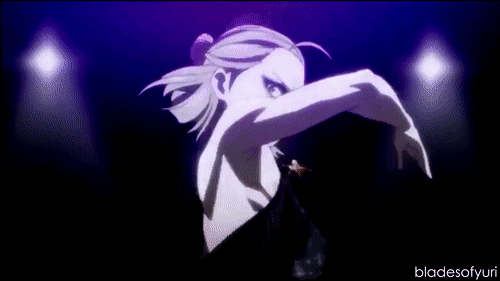
1. So, yeah, I pretty much fell in love with this anime. It’s only 12 episodes, but by the end, I just wanted...more! More with these characters, more with their developing relationships, and more gorgeous animation.
I’m SO excited that a movie is coming out hopefully within the year. If the animation is on par with the “Welcome to the Madness” OVA clip, shown above with Yurio and Otabek, I know that it’s going to be wild.
Seriously, if you want an anime that has heart, humor, and one of the best anime relationships I’ve seen on screen, give Yuri on Ice!!! a shot, and hopefully, you’ll fall in love with it like I have.
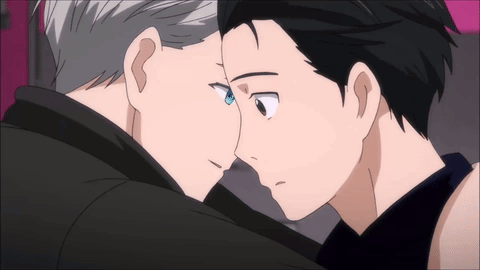
#Yuri on Ice#YOI#Yuri Katsuki#yuri plisetsky#viktor nikiforov#Yuri on Ice!!!#YOI Episode 10#YOI Episode 6#YOI Episode 7#YOI Episode 12#Couples Skating#Yurio#Victuuri#Victuri#Yuurio x Viktor#Yurio x Viktor#Otabek Altin#Otabek x Yuri#Otayuri#ice adolescence#Rhetorical Ink Reviews#happy pride 🌈#BRB Fangirling#Top Anime Couples#Yuuko#yuko nishigori#Takeshi nishigori#Nishigori triplets#YOI Chris#yoi phichit
15 notes
·
View notes
Text
Okay so normally I would have left it at the bitchy post and move on but honestly I’ve had problems with Caithe’s writing for a long time and it’s high time I made a rant post so I can stop thinking about it.
Under the cut is a giant rant about how Anet shafted Caithe’s character and didn’t do her nearly close to the justice she deserved, while in the process messing with the Commander’s story in ways that still bother me and that I’ve rewritten in my own personal canon.
Tagging this as long post in case the readmore breaks. Tagging it as Caithe for personal filing. Don’t like it, don’t read it.
(spoilers for the entire game up through episode 5 of season 4 as well as mentions of abuse and criticisms of Caithe.)
TL;DR - Caithe’s writing is mediocre at best, but she had a lot of potential that was squandered. In my opinion.
The first major problem I have with Caithe’s story is simply the fact that the first and only wlw relationship we’re shown in game for a long time (I think 2 years? no canon major wlw relationships until the end of Season 1) is abusive. While I know Caithe as a character is great way for a lot of wlw to project and relate, it’s still not a great start.
That said, it’s because of this past abusive relationship that we get the base of Caithe’s character and the potential for growth. Caithe closes herself off from everyone and clearly has depression that’s affecting her worldview. Relationships only end in pain, friendships will get you hurt. Combine this with the secret (the Sylvari origin) she’s carrying that alienates her from her own kind and you’ve got the makings of a really dark backstory that gives plenty of potential for a story of “no matter what you’ve been through, you can learn to be happy again.”
In my opinion her involvement in the personal story is....eh. It matches the rest of the writing there. A bit flat, but overall fine with a note of hope at the end that’s pleasant. The Commander is there to bring hope to the hopeless and to beat dragon minions with their favorite stick.
Skipping to season 2, I personally think this is the only truly good season of writing for Caithe. Albeit her involvement is a bit sparse (that’s the problem with trying to juggle so many characters.) but the moments she does get are good. Caithe’s betrayal of the Commander by stealing the egg was honestly one of my favorite moments of her writing. I was genuinely upset with her.
But this leads us to more insight into how terrible Caithe’s relationship with Faolain was and just how devoted Caithe can be to those she loves as well as how abusers can use their power to make their victims do things they would normally never do. I mean Caithe helped Faolain slaughter an entire village of peaceful centaurs (never mind the incredibly racist Native American stereotypes behind the centaurs and the fact that the tribe was killed by British coded people...that’s a different analysis for a different time). It reveals just how truly heavy Caithe’s burden is while also giving us a sense of terror and realization of how fucked things are.
And then she abandons us to fight the Shadow of the Dragon all by ourselves (a particularly hurtful callback to a Sylvari commander).
In Heart of Thorns her writing is...up and down. Finally finding her and having the egg choose us over her is...a moment I’m conflicted on. Yet another moment of the Commander overshadowing her. But it also gives her more justification to close herself off further.
I would have liked more emotional talk from Caithe to vinetooth Faolain, but I understand why they didn’t do that. Caithe is, at the end of the day, extremely goal oriented. Worrying about her feelings while Mordremoth still lives is simply not something she can do.
Season 3 marks the starts of my real problems with Caithe and her writing. The base game through HoT sets us up with the understanding that Caithe has a one track mind. Whatever her current goal is, that’s the only thing she sees. Blinders on, all there is forward. It’s a good character trait that can be both a good quality and a serious flaw.
But the thing anet seems to forget is that once the blinders come off, Caithe can see the mess around her.
Her eldest brother is dead, as well as her friend and her ex lover. And at least part of it was her own doing. Not only did Caithe steal the egg and constantly distract the Commander from their goal of saving Dragon’s Watch and Trahearne, but Caithe knew that the Sylvari were Mordremoth’s minions and told nobody. Imagine if Caithe had revealed this to Trahearne. Imagine if the Pact had been more cautious entering the fray, uncertain what may happen when the Sylvari get close to the dragon that should be controlling them. Things could have been wildly different.
Instead there is no reflection. There’s no moment where you find Caithe just outside of Eir’s place, grieving and trying to process all her emotions. There’s no chance for the Commander to truly be upset with Caithe.
I certainly don’t count the forgiveness Caithe tried to force out of us in the middle of battle as proper anger or emotional processing for either of them. Why can’t I be mad that Caithe didn’t tell anybody the truth? Why can’t Caithe have a moment where she finally talks about her present emotions and has personal growth? Why must her character be so stagnant?
She literally ends her scene with a moment of self pity, proving she’s learned nothing this entire time.
I have no problems with her part in the egg chamber. Aurene is her new Wyld Hunt and she wants to prove to the Commander that she wants to help. Even if the Commander knows better than to trust her anymore.
And now we have to hop allllll the way to season 4 episode 4 to talk about Caithe again. Cause apparently Anet isn’t sexist for not including their women characters, but fans are sexist for not liking them.
Caithe appears at the end of A Star to Guide Us, revealing with a comment that she’s been around for a lot longer than she’s given on but didn’t feel compelled to help us or defend/comfort Aurene. In fact, she has yet another moment of self pity. Telling us that she felt like Aurene didn’t need her anymore cause she flew to Elona to try and save us from death instead of sitting in the egg chamber with Caithe. Cause that’s what I want from the adoptive mother of my child (who’s Wyld Hunt is literally to protect said child), abandonment at the first sign of independence. Not bothering to help save said child from death but then looking for pity and sympathy from the parent who literally died for Aurene.
All or Nothing has one moment that bothers me in particular regarding Caithe. Her branding. While I don’t see anything wrong with the act itself, it was honestly quite touching, I think it was handled poorly and completely erases the Commander’s connection to Aurene. The Commander has had a link to Aurene since she was an egg. That’s YEARS for the bond to grow between them. In A Bug In The System Aurene literally lets us see through her eyes. In Season 3 she’s shown to be following us around while we save the day. There’s an entire mastery line dedicated to our bond with her.
But instead Caithe gets everything. The psychic bond, the new look, all of the story attention. She’s even shown to be one of the only one who cares about Aurene’s feelings (Taimi being the other) even above the Commander.
And the whole reason they do this is so they can finally move Caithe’s character along. Because she’s never once in the writing allowed to grow or learn from her experience. The only way Caithe is allowed to have a happy ending is if someone else fixes her problems and fills the pain up with purpose once again.
That isn’t good writing.
Caithe never once in her entire story arc grows on her own. She’s never allowed to get better or to see more to life unless it’s handed to her on a crystal platter.
Does this mean that I hate her? No. Does it mean that I dislike her writing? Oh yeah. Caithe is repeatedly forced back into her personality from the base game and not allowed to develop in any way unless someone else makes her. That’s infuriating. Where is my story about someone leaving an abusive relationship, trying to make up for the mistakes they made when they were younger, and learning to find happiness in the people around her on the way?
I see why people love her. I see why wlw care about her so much. But to say that her writing is perfect is a lie and shows that you’re projecting your own fanon onto her to fill in the gaps.
You can still love a character while admitting the flaws both in them and their writing.
21 notes
·
View notes